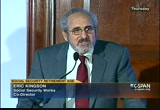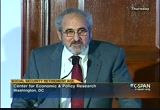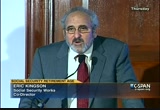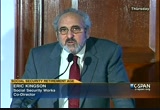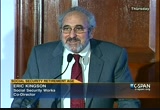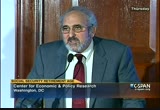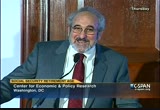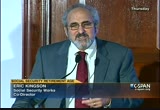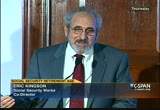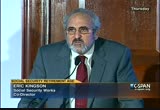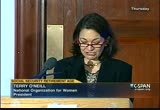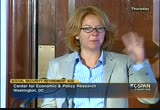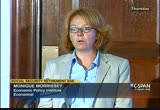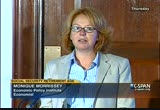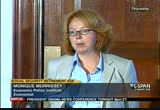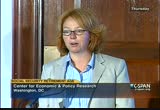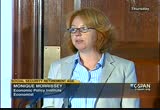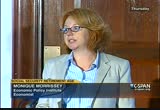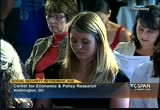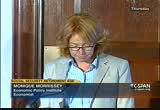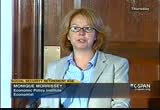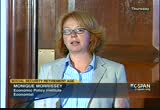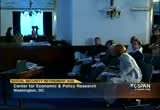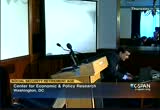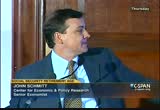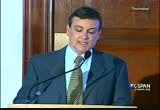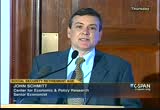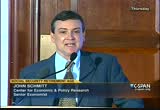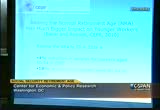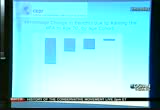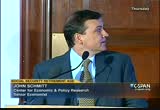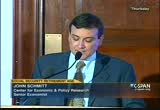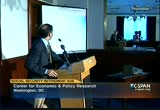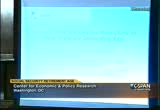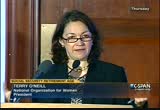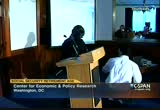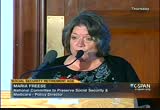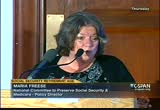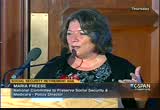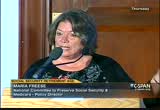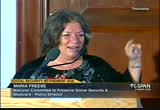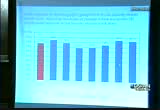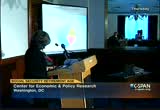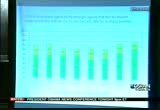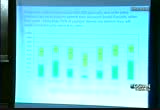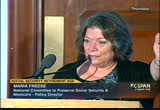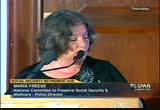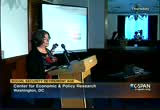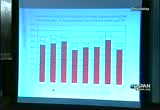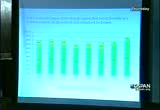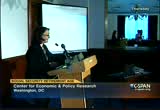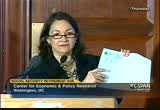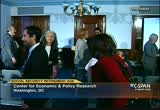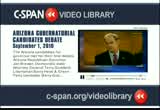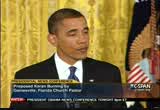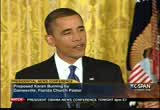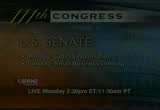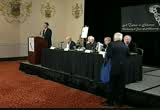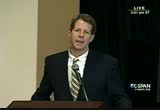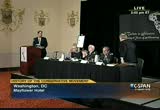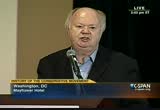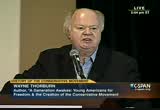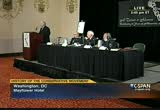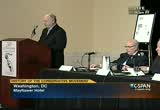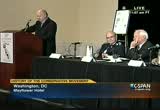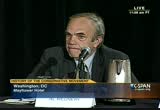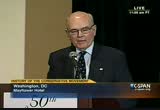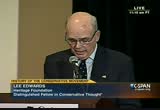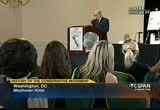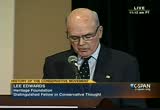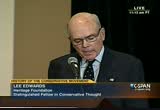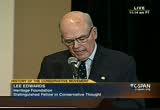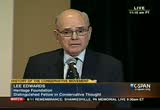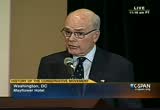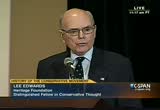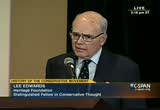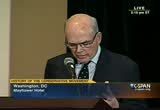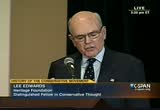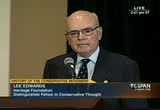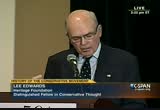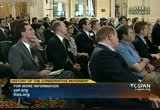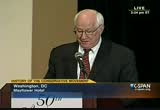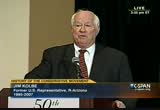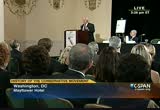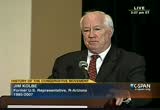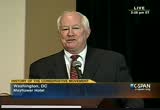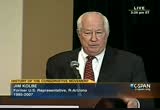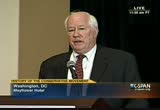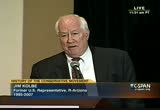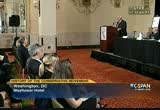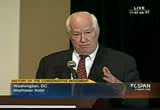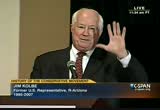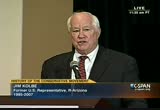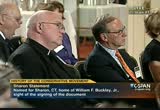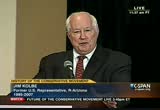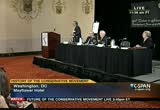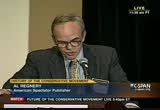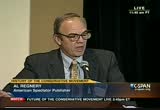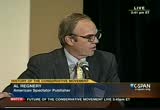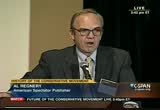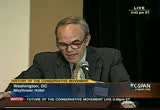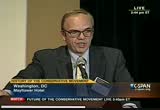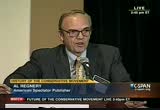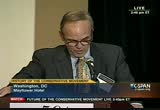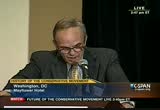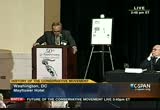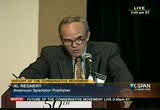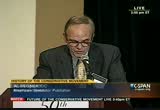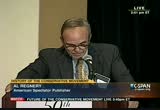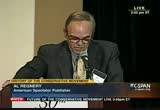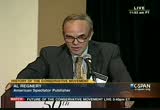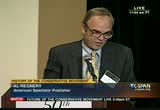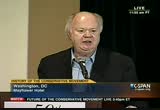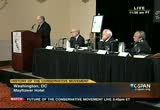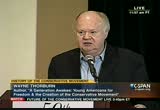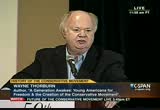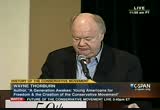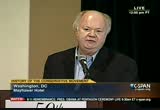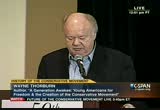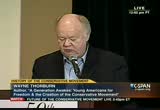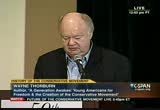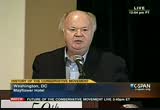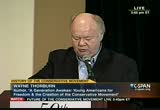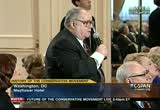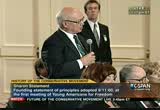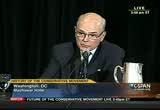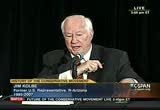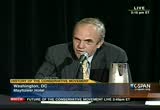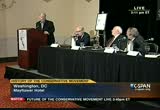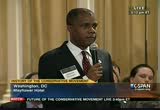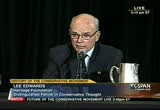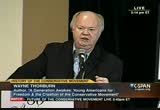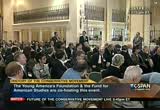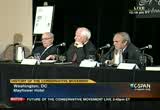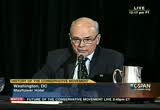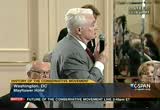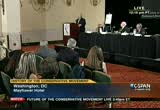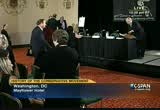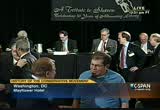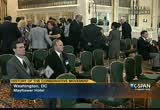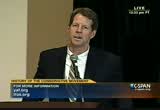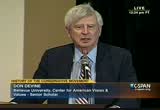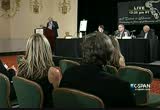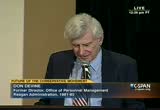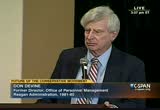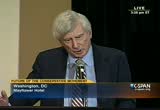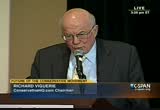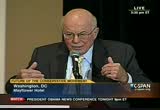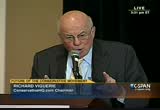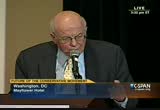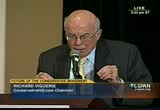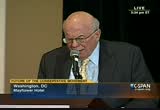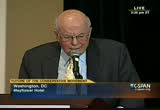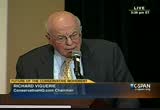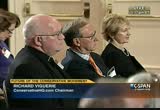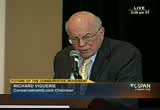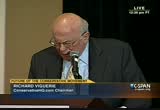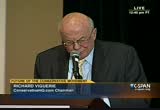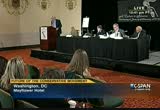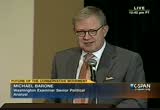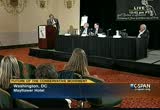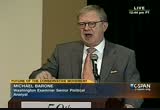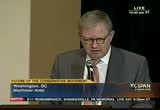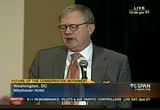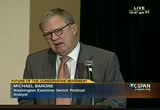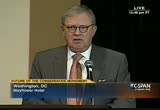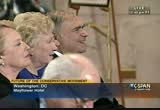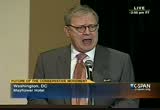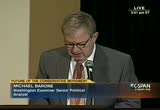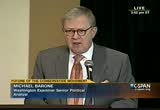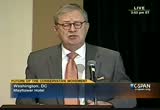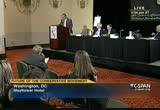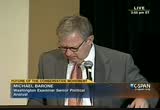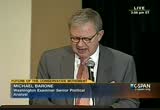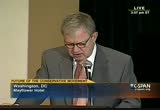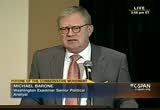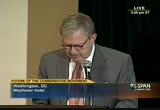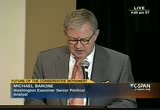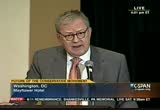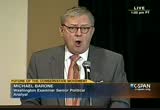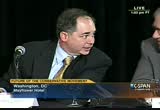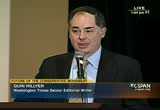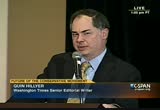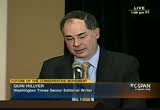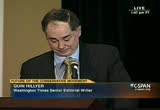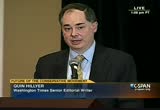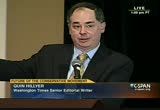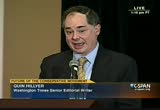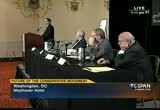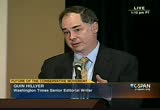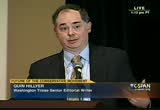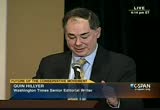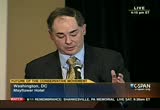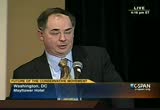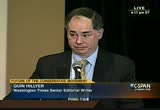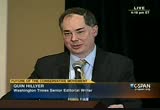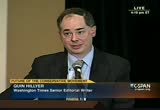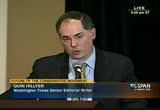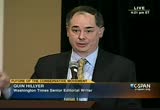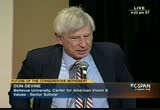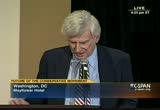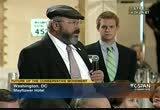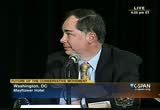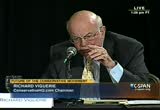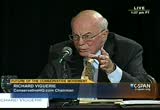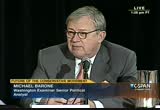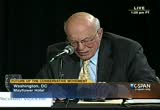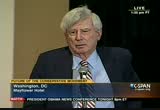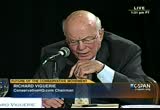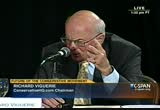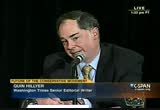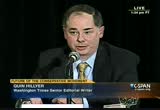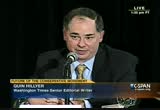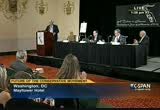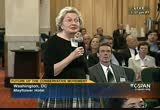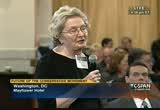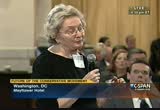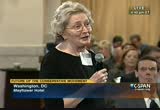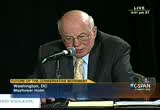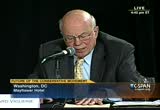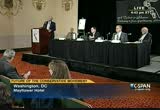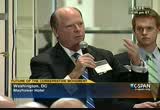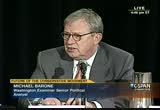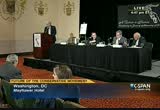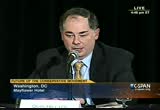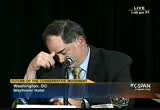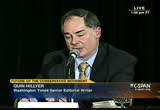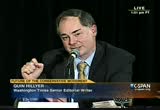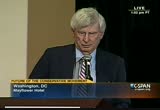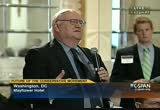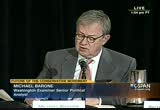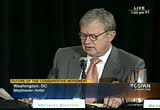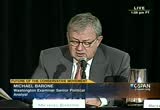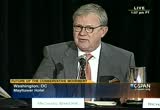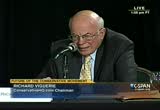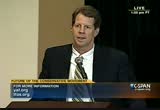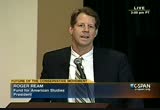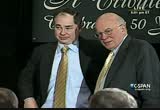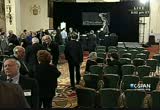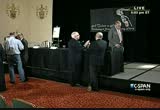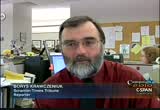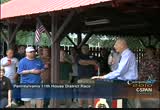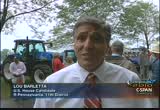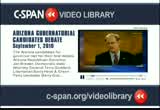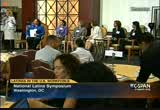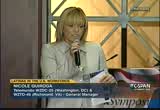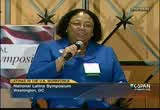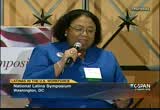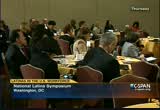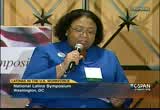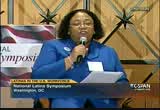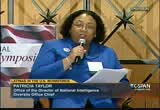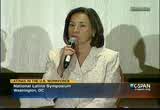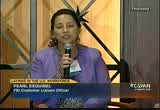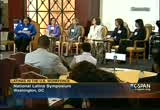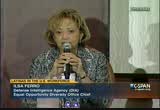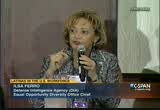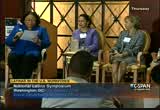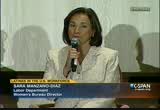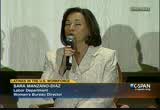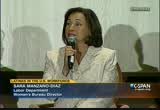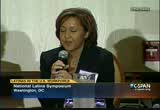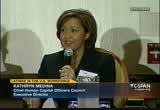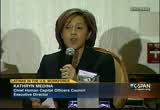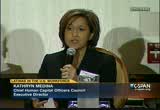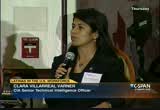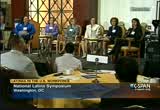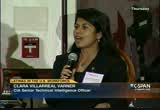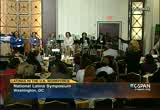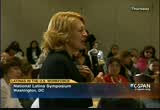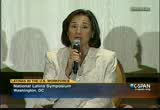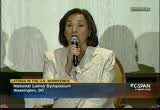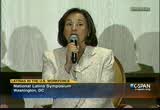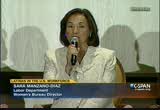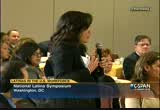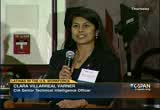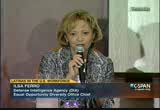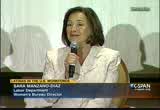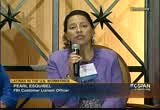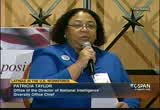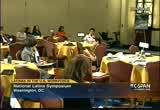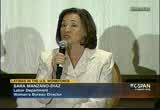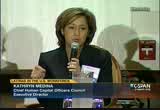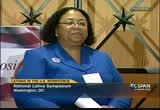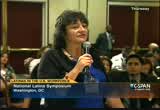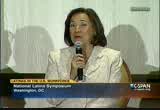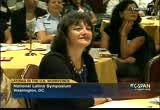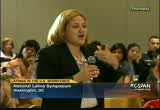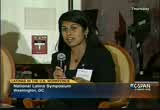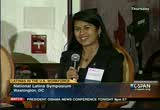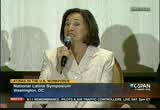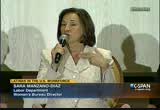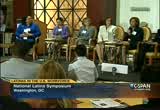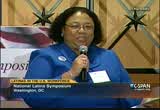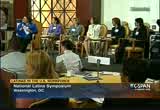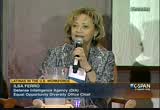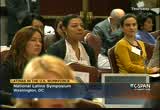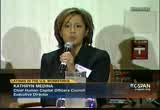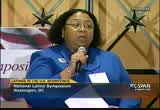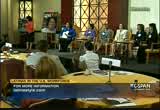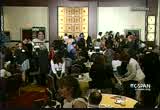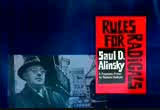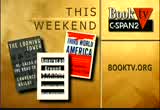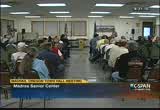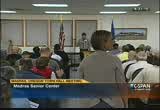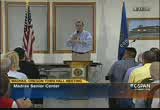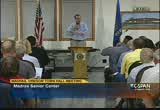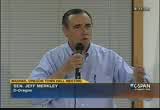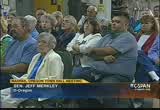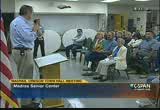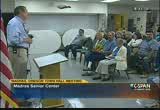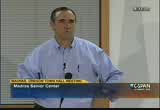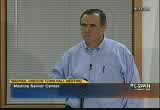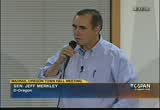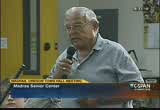tv U.S. House of Representatives CSPAN September 10, 2010 1:00pm-6:30pm EDT
1:00 pm
of first eligibility be raised? should the early eligibility age, which has remained at 62, go up to 65? here is an interesting issue. the arguments come from two angles. the positive it is we want to send a message that people ought to work longer. that is probably true. we be the right. to send it. people should work wander if they can and if they want to. two, we do not want people to accept very reduced benefits. so right now, the early retirement benefit, if you accept early retirement benefits at age 62, your benefit is 75% of a full benefit. once age 67 is a phased in, if you accept it at age 62, the benefit is 70% of the full
1:01 pm
benefit. it the retirement age goes up to say 70 and if early retirement age does not go up, then the benefit you would be receiving would be something in the neighborhood if it was reduced to maybe 55% of a full benefit. so some would say for purposes of adequacy, we should raise the early retirement age. i would say absolutely not. i am stating that argument because it is rational on one hand. but the political argument is simple. i do not believe you can really raise the eligibility for social security, the general age, without also raising the age of first eligibility. so for very important reasons, we ought not do that. plus, many people need that option. it is the only thing they have out there. those are my take-home points. now to sort of cover whatever in cover in the context of the next
1:02 pm
few minutes here. first of all, let me talk about some definition issues. there really is no one at retirement age under social security. there is really a band of retirement from age 62 to 70. if you accept benefits at age 62 today, 75% of the full benefit. if you accepted at age 66, it is 100%. and if you accept it at age 70, is one under 32% of a full benefit. a retirement age increase results in the benefit reduction at all those ages. so that when and moves up to age 67, if you accept it and 62, it is 70% instead of 65% of the full benefit. if you accepted at age 70, is 124% of the full benefit instead of one had a 32%. it is important to understand that the age of eligibility is
1:03 pm
pure and simple, increases in the age of eligibility are pure and simple at all ages that you accept benefits. as an academic, i'd like to say that retirement is a fairly recent institution. going back 100 years, we do not have this as an institution. and a piece of its history, our first patients came in part to regulate the behavior of employees. the private pensions were rewards of for a long work, and we used to regulate labor markets for companies. the retirement age, the existence of retirement age in our society is a function of decisions, both of increased productivity in the last century and decisions we made about allocating leisure. much of the leisure we chose to take from increased productivity went into shorter workweeks,
1:04 pm
went into longer vacations, earlier than in the last century, before say the 1950's. after the 1940's or so, much of the increased leisure went into what we call retirement, a time of non-work. we created this institution. it is malleable to some extent. it is also terribly important. the yearly retirement story is interesting. it begins to some extent with the unions very successfully negotiating 30-year and out early retirement options, and many of the unions that have defined benefits in many of the businesses agreed to early retirement provisions that served the purpose of on the one hand, rewarding workers for long-term service, and two, turning over the labor force. i say that because the flip side of all retirement age policies
1:05 pm
also employment policy. and it is important to remember. the initial retirement age was set at 65. it was kind of an interesting thing. you talked with two that were involved in the planning, and they basically said, you know, we really did not have a scientific study. we basically thought 65 was about right. that is not an argument for me for raising it. it is sort of an interesting artifact. at age 62, the retirement provisions started with women in 1956. women's organizations, women's clubs advocated for an earlier retirement age for women. the reason was in that theory that at that time when men tended to be three years younger than their spouses. so that was something they wanted. in 1961 in the midst of a significant recession, we have
1:06 pm
the kennedy administration proposing reducing retirement age for men, and you have a congressmen standing on the floor of the house of representatives saying it two million older workers retire because of this provision, that is two million more jobs for younger workers. so there is this kind of interaction between employment policy. somewhere in the mid-1970s, a distinguished economist and former president of maybe the university of north carolina and later as secretary of commerce, she came up with the notion of raising retirement age. and it was the first time it was really put forward, and most of us thought that is a strange idea. over time we became acclimated to it. in the context of the last round of social security reforms, it was discussed.
1:07 pm
the greenspan commission did not reach agreement on raising the age of retirement under social security. they agreed to disagree on that. that was done in the house primarily. the house and senate. it was done in what is often called the battle of the condiment. picco, pepper, and heinz were critical members of congress in the senate at this time and very involved. [laughter] it is early in the morning. you're a little slow on the uptake, but then again, i am not begun delivery lines. it was congressman pickle was pushing for raising the antar -- retirement age. congressman pepper was opposing it and wanted to stick a tax increase out in some future year in social security if it was needed, and the house and debated over that and a coalition of moderate and conservative democrats and
1:08 pm
republicans past the retirement age increase for social security. so that is how it rears its ugly head. more recently, it comes in the context of proposals that are delivered self righteously, oftentimes bite tenured professors, by economists, by politicians that we ought to be working longer. it really ends with this. there's a lot of things i will say. it is and i getting into the complexities. some are here. there's a whole language of how we talk about retirement that should be understood. we have a very individualistic retirement decision literature in our country. we talk about individual decisions as if everyone makes a decision to retire as opposed to it happening to people or something people have to do. we have a very diverse population, diversity by income,
1:09 pm
by race, by ethnicity, by health, and the retirement age is one broad brush of a policy change that cuts across this and harms those most at risk. ultimately, i would say it is really very simple. raising the retirement age is a benefit. pure and simple. and it really hurts to keep americans who we should be very concerned about not hurting. it is not necessary. i do not believe any cuts are necessary. i actually believe we should be increasing benefits. but even if you want to cut benefits, it is a terrible way to do it. and we should get off the table. it is also terribly offensive to regular people out there who are looking around, and they're hearing the talking heads. they are hearing this self righteous folks say to them, you have got to work longer, and your children have to work longer. we're talking about raising the retirement age of people in their 50s, in their 40's, their
1:10 pm
30's. we are saying, you all have to work longer in the midst of this extraordinary recession, and there's a tremendous a disconnect out there, and i also think probably tremendous anger when americans hear this. i ended this with a few questions or comments. i think people out there are asking, who are these people telling me i have to work longer? i am working pretty hard. the cab driver was riding with today said i am 70 am i getting hundred dollars on social security, and i am working because i do not think i can afford to stop. people are working if they can, but your these people? what do they know about work anyway? of these folks telling me to work longer. and you have got to be kidding, look what is happening all around us. they're not a lot of jobs. why would we ever want to do this. and p.s., if we want to change retirement age, france has
1:11 pm
provided an excellent example. we should lower it to age 62. [laughter] [applause] >> thank you. i also like the example that our colleagues in france have shown by hitting the streets when it is suggested that we raise the retirement age. our next speaker is monique morrissey, an economist with the economic policy institute. she joined the eti in 2006. previously, sure that the afl- cio's office on investment, and her areas of interest at epi include retirement security, labor markets, federal reserve, and executive compensation. money is going to talk about what the real drivers of the fact that the social security system, although solvent, really flushed for the next nearly three decades, is not flush for the next 75 years.
1:12 pm
and the best practice would require that it be sold and for the next 75 years. she will talk about the fact that the primary driver of this so-called shortfall is actually not life expectancy. monique. [applause] >> thank you. banks now and things to the leadership council for organizing this. i know these things are hard to set up. first of all, can somebody give me a little bit of a wave because i know we might be short on time, so when i have a couple minutes left. i am going to try not to repeat a lot of my presentation which overlaps with others. i will try not to repeat what was said and focus on exactly what was mentioned. before i start, i want to mention that if you want to get the full peace, i did not prepare a powerpoint, but there
1:13 pm
is a graph with my remarks outside if you have not picked it up already. so you can get it from the table outsider come see me. before i start with what i was planning to say, i want to mention that usually my past history is not that relevant to my current work. i used to work with pension funds for unions. in this case, it was. one of the things that i did it the afl-cio, i worked there during the last fight over social security, the privatization fight, and one of the things that it was look at how wall street was funding privatization. there were not doing this publicly because it does not look very good for wall street to be doing this, but they certainly were doing it behind the scenes. i would say that the current situation, exactly what was mentioned, which is going on here, you do not see a big push by wall street on your disgraced and now saying we should be cutting social security. it looks very bad. but what you see in washington
1:14 pm
is what i call and tell wind. there is no resistance. it is like you're biking along in moving forward, and nobody's pushing back. aside from a lot of groups like now and the leadership canceled or underfunded but not overwhelmed, you know, they're pushing back against us. the where the money is definitely all in favor of cutting social security. in my remarks, i am an economist, and they will focus primarily on what i call the bunking actuarial determinism. and i sort of dismayed at this term, but if you think about it, in the history of the economic summit there is this man who said that we are having too many babies, and we're all going to start. it turns out that the economy grew in that was not the case. we have a certain amount of logic right now that is similar to what was said then. it is like, we're living longer, social security is not sustainable. and it turns out that living longer is one of many, many
1:15 pm
factors that affect social security finances, and it is not a major factor at all. in part because we live longer in retirement, but we're also living longer before retirement, and we're putting more years of work in before retirement. there are a lot of other factors. immigration, increase in the work force that contributes. immigration. i would like a little bit today but you can take any number of changing trends. change in the birthrates, all of these affect social security finances. because this is organized by the women's groups, one obvious one is that women have entered the workforce, and women have always received benefits through social security primarily in the past as spouses. now they are receiving them as workers. this is very beneficial to social security finance. i like to make a point that the people who are supporting raising the retirement age focus narrowly on increases in life expectancy to make it look like there is this mathematical
1:16 pm
permit -- determinism that it is not sustainable for that reason, and it is not bear close scrutiny. so again, to go very quickly over the 10 points that i would make, but i think i will skip some of the mind the interest of time because they will be covered by other people, the first point i want to make is that raising retirement is a benefit cuts. do not be fooled. it is not have anything to do with working longer. it is an across-the-board cut. and to add insult to injury, they say you could make it up if you work longer, so keep that in mind. the second point, which will focus on today, is that life expectancy is not the problem. it is not because this deterioration in social security and finances. there are a lot of other factors. it is one of the many factors that determine the projected actuarial balance, but it is a fairly minor one. you do not have to believe me. i will quote the chief actuary for social security.
1:17 pm
the life expectancy should not be viewed in isolation. you have to take these other things into account. also want to make the point quickly that there are a lot of people, including the co-chair of the fiscal commission, the like to focus not only on the fact that people are living longer, but the sort of like to blame the victim. like people are retiring a lot younger than they used to be. no one to make a point that many people who "retire early" are not making that choice. a lot of these people lose their jobs are unemployed, especially now, but this is always been the case. if people retire because their spouse is sick or because they are sick or because they lose their jobs. this idea that people are making the choice to retire early is very misleading. also, going back to the point about women working, entering the labor force, some of the same people who are saying that we're focusing on this actuarial demographics say we
1:18 pm
used to retire, and then they take a number. we used to retire at 68 or 67. and who is we here? we hear is men, right? so what has happened is we have seen a decline over decades in the retirement age, but that is because there has been an increase in people working at older ages. so there are more people working, but they tend to retire a little bit earlier because women tend to retire a little earlier than men because they often retire at the same time as their husbands do, and their husbands are often older. forget that point. that is a non-issue. it is not true that we're working less at older ages. we're working more than we ever ask been at older ages. that is what matters with social security. it is not the retirement ages. the other point which i think heidi made also is that people, and i think this has been pretty much of the bunt, but this concept that social security is
1:19 pm
an entitlement and entitlement costs are spiralling out of control. that is absolutely not true. social security is going to increase a little bit, but it is going to level off. when you see those charts that show a title misspending spiraling out of control, what is driving that is rising health-care costs. if we can keep health care costs and train those, we do not have this problem of spiralling entitlement. it has nothing to do with aging or life expectancy. it is about health care costs. the other point that was made is a social security cannot add to the public debt over time because social security cannot borrow. i do not want to get into this too much. there's a paper i brought with the economic policies. ade was co-authored by harry valentine, who is the former chief actuary of social security. it basically makes the point that the current chief actuary made repeatedly, which is social security is prohibited by law from our way, so we can run a short-term deficit only when it has savings i and a trust fund.
1:20 pm
when the savings runs out, it cannot borrow. so when the baby boomers retire, it will be running a deficit temporarily. but over time, it is a balanced budget program. there is no with the social security can contribute to a long-term deficit. it should not be discussed in those contacts. so if that seems counterintuitive or complicated to you, i would, rather than spend time on it today, mention that there is a paper out there that explains that. also, the point that heidi made that we should not shrink the only part of our system that is working. there are a lot of numbers out there, and a lot of those people who are proponents of raising the retirement age will say that these are temporary problems. we have seen a sharp decline in assets in retirement savings and other kinds of savings, specifically home equity, which is still half of what it was at its peak.
1:21 pm
and this is not a small thing because historically, home ownership has been the biggest component of people savings, not retirement savings. if you did not have the traditional pension plan, what matters is you have equity in your home. the savings and ira's and 401k's are 12% below in 2009 than they were in 2007. you might think it is a temporary blip and will take years to catch up to where we were before, and that was way too low. the typical person had $45,000 in a 401k and retirement savings. it was not enough to begin with. it is absurd that we should be talking about cutting the one part of our retirement system that works when everything else is proven to be a disaster. and going back to the point of, wiry not focusing attention on the private sector and on why 401k plans to not worked very well? going back to my earlier point about because there are a lot of
1:22 pm
people that want to make sure that is not the focus of attention. and the other thing is that in a lot of cases, we often stand here and say what we ought to be doing, but it is the politically popular. in this case, maria will go into it and more links. but basically, this is a case where people are willing to pay more for social security. so i have been told to wrap it up. i want to make the other point, to reiterate the point about how if you are focused on life expectancy, keep in mind, this is the net increase for people at the top. those are also the people to the amount they're paying in taxes to social security -- the amount of their incomes that have been untapped has risen over time because it is increasing in equality. these two factors, rising health-care costs and increasing -- a function of the poor labor market, increasing
1:23 pm
income inequality, these are the real factors that have caused a deterioration in social security finances. again, i should have probably focused on those points, but these are in my prepared remarks, and if you want to learn more about this, is also happy to talk to anybody afterwards. thank you very much. [applause] >> thanks. our next speaker is a don schmidt, a senior economist for the center for economic and policy research here in washington, d.c.. john has a inextensible noneconomic inequality on unemployment, on that the new economy, the welfare state, and other topics both for academic audience is a popular audiences. he will be summarized in recent cepr research the fines substantially longer life expectancies have not translated into comparable increases in
1:24 pm
retirement years and the fact that raising the national retirement age will actually have very little impact on the national deficit or the national debt. [applause] >> thanks a lot. let me get this set up real quick. >> thank you. thanks very much, and thanks for the chance to be here today. i am is standing in for nicole wu who is the director for domestic policy. what she has asked me to do is to give you the headlines from 3 reports that cepr has put out, and i will probably start calling that "seeper" as some
1:25 pm
point. cepr as look at raising the national retirement age. as i said, it is just going to be the headlines. we have copies of the paper here, and we have copies in the front as well and on our web page, cepr.net. and what i would -- these are the 3 reports and a bonus, which is the 2020 debt stimulator. -- simulator. there's a team of people at cepr that works on social security, led by a -- baker and with other colleagues. one is here today. and nicole wu is our point person on this, so i would urge you to get in touch with her or me or anyone on our team if you have questions about social security that come out of the talks today. we talk about the first three
1:26 pm
papers, and i want to call your attention to the debt simulator, which is something that looks at the impact of various proposals to change so-so security of a long term, and it will give a clear idea of how irrelevant, for the most part, a change in the national retirement age is to the debt situation. and how many other options we have in terms of dealing with the long-term, modest financial challenges with social security. but let me shift now to talking about these three reports. the first is a report by david ross neck that stresses -- a dress is the argument people make, which is we're living longer, creating stress on the social security system, and what we should do is raise the retirement age. i think david has done an excellent job in showing that if you look over the last century, there has been something a bit above the 20-year increase in life expectancy.
1:27 pm
that sounds like we're living a lot longer, but it is important to look to the composition of that increase. more than half of that increase is from people living from age 0 to age 1 or from ages 0 to age 5. huge improvements in life expectancy at birth for children. so it is something over half of the 20-year increase just at that level. the second accounts for about a fourth of the overall increase in life expectancy and has actually taken place during people's regular working lives. imagine that in 1899, someone might have died at the age of 58. now they are actually living until 65 or 67. so they are making many more contributions to social security during that extra lifetime they have for work, and those are more than compensating for the increases in life expectancy at 65. if you look from 65 forward, it is just about a fourth of the
1:28 pm
increase in life expectancy over the last century and took place after the age of 65, the kind of retirement age that was built into the original social security system. this was a relatively modest part of the 20-year increase, and it is something that we can handle it very easily deal with by other measures and just increases in productivity growth. there is a very nice graf in this particular report. they're the kind of graphs that we take a careful study, but you can see the top line, which is the increase in life expectancy is 65, and it is much smaller than the increase of life expectancy at birth, which i think is the bottom line. you can see the huge increase related to increases in life expectancy, particularly of young children. this is another way of making the same point, that a 20-year-
1:29 pm
old man born in 1899 could expect to work for 39 years born in 1949, expect to work about 42 years. those born in 1999, they can expect to work about 45 years. there's an increase in life expectancy at 65 but for younger ages as well. the second report that i want to pull the headlines from is a report that was produced recently by my colleagues that shows very clearly a point that several people have made already today. they are raising the retirement age in a very unequal way to affect -- will have a very unequal of fact across divert kinds of workers. two obvious points will focus on here, but there are more examples in the report, are that, first of all, it is younger workers the hardest. think about this. in order to prevent long-term declined in the benefits for children for the next
1:30 pm
generation, what we're going to do is to implement mandatory declines and benefits for the next generation. and you can see that right now. an analysis was done here with a look at the impact across workers of a certain age, different ages as of right now, under the assumption we would increase the national retirement age to 70. you can see that the attack on 55 to 59-year-old is much smaller than the back on 40 to 44-year-old. and it gets further and further back you go. if you're concerned about generational equity, you're actually implementing a plan that the first thing it does is have negative enter generational equity considerations. the other point is that the impact of this is a very much a disproportionately against lower-income workers. you can imagine that lower income workers depend much more
1:31 pm
on social security for income after retirement. so any kind of that has a disproportionate impact on this, in this graph here looks just that people 40 to 44 and we're looking within the same age group. you're seeing the the bottom as much larger declines in overall income as a result of raising the national retirement age. the third report, and this is a point others have made, and this particular report is a good job by quantify some of the dimensions, so it is well worth a look. the final of the 3 reports and want to summarize quickly today is one that addresses this idea that since we're all working in front of computers now, we all should be able to work a lot longer. a month several people have made the point that we're not all working in front of computers.
1:32 pm
just a lot of people that want to cut social security. [laughter] a colleague who is here today did a very good job, i think, of taking analysis on the specific paths involved in occupation, and mapping those two and nationally represented data set that looks at what kind of jobs workers have. following methodology that the urban institute initially put together as we are grateful to them for their help with that. basically what she did was identified two kinds of jobs that i will talk about now. one was physically demanding jobs, which are jobs involving, and i will read this i get it right, handling and moving objects, spending significant time standing, and general physical activities. the second kind of job that she identified was it difficult working conditions, jobs with typical working conditions, and their jobs working in a cramped space, working outdoors, jobs involving exposure to extreme
1:33 pm
debitors common contaminants, hazardous noise. there's a concrete definition of what is physically demanding job is and what a job was difficult working conditions is. and what she sound was pretty -- where she found was striking. there may be fewer people today that have physically demanding jobs and in the past, but there's still a lot of people today working physically demanding jobs and difficult working conditions. looking at the population over age 58 that is working, there are over a third of the population that has a physically demanding job. that is 6.5 million people. not a small number. about a fourth of the population 58 and over are in jobs with difficult working conditions. about 5 million. when you combine the two and take care of the overlap, your lesson about 8.5 million people 58 and over who have jobs that are physically demanding or a difficult working conditions.
1:34 pm
there is a very nice graf in the report that you can get online or outside that breaks this down and shows the different kinds of jobs by age. to reiterate the earlier point, this is also very unequal across different kinds of workers. latino workers, for example, over half are in jobs of our physically demanding. but to no men have rise to 62%. over half of african-americans are in jobs that are physically demanding. that is also true for asian pacific americans. minority workers are disproportionately going to be affected by these kinds of problems of having to continue to work physically demanding jobs. and the lower wage workers are not surprisingly also much more likely to be in physically demanding jobs. over half of older workers in the bottom percentile have physically demanding jobs. we have been as graph that shows the share physically demanding
1:35 pm
jobs by level of wages that people are in the bottom versus the top. it is a big difference. it is quite unequal. so i will conclude their by encouraging you to check out these particular papers if they seem to be helpful to your understanding our arguments you're making around the issue of social security. and i encourage you to look at it that simulator because it is interesting to see just how inconsequential been net raise in the retirement is for the solving of the small long-term problems for social security relative to the big impact it has on social security. i urge you to contact nicole or any of cepr us of if you have any questions. thank you very much. [applause] >> thank you so much, john. i really do think what hits me a lot about your presentation and things that eric said, i just
1:36 pm
find is so reprehensible that the harshest sacrifices that are being proposed with our federal budget deficit, those sacrifices we oppose the most on people who do not look like the members of the fiscal commission to 18 members, and they're overwhelmingly white and male. their life experience, i suppose makes it understandable that they are not really keying into the kinds of damage that they will do with their proposed cuts to social security benefits. although it is understandable, it remains, in my view, reprehensible. our final speaker is maria freeze, counsel and director of government relations and policy for the national committee to preserve social security and medicare. maria is going to be talking to us about the results from a recent poll conducted by the university of new hampshire for the national committee, which found that policymakers in
1:37 pm
washington are really out of step with the people of this country as a look for ways to cut social security and reduce the nation's deficit. maria, thank you so much for being here. [applause] >> thank you so much. the handouts are working their way through the crowd here. thank you. thank you very much. i want to start out first by saying i appreciate being invited to join you here today. there's one thing i have learned from the men in my family, there's a real challenge to batting cleanup, as they call it. you never know just exactly how much time you'll have to do your presentation. so i will have to talk really
1:38 pm
fast because i think we have already kind of run over this time we have available, but i did want to let you know that the polling we have done here that we are presenting was done by the national committee to preserve social security and medicare foundation. it is not unique. we have done similar polls. this one was done by the university of new hampshire. because their service center is nationally known as a non- partisan and academic public opinion research center. it conducts polls for the boston globe, and in recent years, they have conducted political polls for cnn, fox news, usa today, philadelphia inquirer, pretty much everybody under the sun. but we have also done polls and focus groups with groups, and we're not the only ones. and number of other groups and similar kinds of work. what you'll find is that within a couple of percentage points, basically the margin of error,
1:39 pm
we are all finding the same results. there's really nothing unique about this particular set of material. it was done by an entity that we selected because we did not want to be accused of having some kind of bias. and the reasoning that we decided we wanted to do this poll was because we know that is directly americans of social security. there is no doubt in anyone's mind about that. the national committee itself is a senior organization with over 3 million members and supporters. the governor all walks of life. we're pretty evenly split between democrats, republicans and independents ourselves. but they all band together, and the reason is because they are passionate about protecting social security and medicare, not just from themselves. but also for their children and grandchildren for future generations. this is very frustrating sometimes to hear organizations like ours characterized as one that just about old people taking care of themselves.
1:40 pm
most of our members really care about this program for their kids. we found that out particularly during the bush privatization years because our members, as our president went around the country doing events on privatization, the people who pram the crowd, the people that were the most vocal, the most adamantly opposed to privatizing the program knew that the privatization that the president was proposing and the time was not going to affect them. it is not about protecting their benefits. it is not about protecting their wallets. it was about looking at them are children who were in their 30's or '40's at that time and their grandchildren and knowing that these young regeneration is, for the most part, do not understand the value of the program because of course you have kids, education, homes, and a lot of other things they're worried about. i have to tell you, their retirement is one of the last things they are thinking about in their 30's, but the older generations know how important these two programs are going to
1:41 pm
be for them, and they were the ones that are out there on the front lines making sure that the program did not get privatized. we're finding the same kinds of things now. however, the one thing we were concerned about was because of the deficit situation, we wanted to find other people's attitudes had changed. a people suddenly begun buying this argument that because of the financial situation that the country is in, we cannot afford social security. and that was primarily what was driving our decision to begin this work last fall. we began with focus groups. we did one round of polling. and we did this particular round of polling later on in the spring. so what we have discovered in this process is that, in fact, people's opinions about social security have not changed. and it is interesting because we have found that this is not just limit itself to the older generations. it is across the board.
1:42 pm
i will also mention the version of the power point that i am going to go through today that you have in your hands is a shorter version of the study we did, and more expensive version is available on the national committees website and on the national committee foundation's website, and you are free to go through that as you want. and the vast majority of people, not surprisingly, do not know about the deficit. a surprise so many people have not heard about a considering is seems to be on the news cycles 24/72 but a significant number of the population now we have a financial problems as a country. however, when there were asked the open-ended question, what you think the problem is? what you think caused this deficit? we turn that with only 2% of the people who peg it as being a problem with social security. a it is about the same number of people who thought nasa was the problem. [laughter] there were a lot of other things
1:43 pm
people identified. social security was not above the top of the list. so it flows as a natural connection that they did not think social security should be cut to deal with the deficit problem. if you have something that is not causing a problem, you do not shrink it in order to secure the problem, and the american public understands that. there were 77% of the people who took the position the social security should be left alone. in fact, if you look at the breakouts, you can see the national average is up front. it crossed party lines. it crossed age groups. we also found it crossed income demographics. we polled in different parts of the country. it made no difference whether you're from a red a state or blue state or a purple state or some other state. people did not believe that social security should be cut in order to reduce the deficit. in fact, we got the same
1:44 pm
comparable levels of results when we ask the question, do you think should be cut to strengthen its own finances? we found because similar results. people do not believe social security should be cut. and so then we asked a series of questions about whether or not social security was important in this kind of economic time or whether we thought that it was somehow the cause of the deficit problem. again, we found a significant portion of the population believed social security provides stability and security to its people and very, very few believed it was a drain on the economy despite the many, many millions of dollars that had been spent to try to convince them otherwise. again, when you look at the demographic breakouts, you end up with the same issue no matter what party identification you had and the matter what age group. there were within 10 or 15 points of each other.
1:45 pm
this is a significant amount of unanimity among different groups of people. then if you asked a similar question, which was, how important is social security to the american working family, we found very, very strong support to the statement that the recession underscores how important social security is to american working families. rather than the recession showing the weekend out of for the program, the american public, in fact, believes that this is the kind of economic situation that highlights how important social security is to american working families. this is an interesting set of questions that we asked. because we asked the question, do you personally think you're going to need a social security when you get to retirement? and we ended up with a very, very strong majority who believe that, yes, they expect that they
1:46 pm
will meet social security when they retire because 70% of the people were in that category, and if you look at the first two columns, those are the people that had that view the most strongly. then we ask the question and broke up the question by income categories and by age. for this, i found it fascinating that if you look at this income group, this age group, these are the young people. these are people 36 and younger. and we started at about 18. so this is a group that the changes are supposedly being made to benefit. what you'll find is that this group of people who do not think social security's going to be there for them, by the way. these other people when you poll them, they will not be there for them, because tens of millions of dollars, hundreds of millions of dollars have been spent trying to convince those people
1:47 pm
in particular that social security is not going to be there for them. you remember the old survey about their believing in aliens about as much as they thought social security was going to be there for them. so they do not think it is going to be there. they worry it is not going to be there. but absolutely, things will needed. part of the reason is because they know that they themselves are barely struggling to get by as it is. they know they're going to need a program. and they have the ability to look at the generations beyond them. they look at their grandparents. they see how much of their grandparents rely on the program. they look at their parents. they see what happened to their parents in the recent economy. most of the parent's lost a boatload of money in their 401k plan. most of their pratt -- parents are planning to retire on the home-equity of their loans. some are under water. so they're looking at the generations ahead of them, and they're rapidly discovering that social security is the only thing left.
1:48 pm
and in the bad economic times, even though you do not think politicians will protect it for you, that is the only thing you'll be able to rely on. when we do the focus groups, we found is coming through very strongly. so for people that a lien on just the question of whether young people believe in it, we tried to remind them, the main not think it will be there. they may worry that it will be there, but they absolutely will need it. that is extremely important. on the political side, we asked a political question because this is a political year. what we discovered is that a significant majority of americans are more likely to vote against a candidate, vote for candidates -- likely to vote against a candidate whose support cutting social security benefits. this 9% are the only people that will support candidates to vote for cutting social security. this number are the ones who believe that they will not vote
1:49 pm
for candidates to support cutting benefits. they have some people who just do not know or for whom social security is not the only issue will base their vote on. so we believe that members of look at cutting social security at their peril. and they need to make sure that they keep that in mind. now we polled the various options that people are looking at for making social security changes. this is raising the retirement age. it is polled the least favorably. we checked the flat benefits which is basically nothing. we reduce the starting benefit. and removing the wage gaps. what we found about removing wage caps is that it had strong support among people with incomes over $100,000. the only people that will be affected by increasing the wage caps. so we also found in our focus groups of people were much more
1:50 pm
willing to pay more, higher payroll taxes, higher wage, any other way to pay more to social security and they thought it would be there for them. if they thought it would be protected, then they were to cut the benefits. on the retirement age, again, across party lines, across demographic groups. across parts of the country come a very strong opposition. including the people 35 and under who you'd think would be the folks that would be the most willing to raise the retirement age because they're so far away from retirement. but in fact, we were quite surprised the the strength of that particular demographic group was as high as it was. and part of the reason is because the deficit situation has not changed americans' views of the social security. they think it is their program. they understand every paycheck, a payroll tax is going up to pay for this program. they thoroughly resent the fact that the government is running
1:51 pm
deficits, and they have been using social security surpluses to pay off other programs. they think it is their money. they think it has been wasted on other programs. the want it back. they're opposed to people thinking about taking their money and not giving them back the benefit for it. again, they think it is a promise that was made to them and they think should be kept. while we have discovered that there's a huge disconnect between what the american public is and were members of congress are, we believe that the american public is strongly behind it. the reason people have not heard perhaps more than they have from the american public is that frankly, they do not know the congress is thinking about cutting benefits. what we discovered in the focus groups is most people have no idea there is a fiscal commission. we get all wrapped up in this stuff happening on a day-to-day basis here in washington, d.c., but if those people outside the beltway and on others a fiscal commission and have no idea congress is thinking about getting their benefits. when you tell them about this,
1:52 pm
they are appalled. so when the word gets out, hopefully people will be hearing more about this, but the need to understand, particularly members of congress, that this is a much more descriptive explanation of were the american public is that what they're hearing from their economists and from some of the other people that have been looking at the program since its inception. thank you. [applause] >> thank you so much, and thank you to all of our speakers. i hope this has been informative for all of you. i do not think we have time for questions, unfortunately. but i believe that the speakers will all be willing to stay for a few moments if you want to approach them individually. we have a typo in one of our handouts. and i misspoke earlier. this briefing has been organized by social security matters, which is the coalition of women's organizations working on
1:53 pm
social security, not social security works. they are a strong ally and social security matters, so we love both organizations. but social security matters is brought you this briefing. also, eric want me to point out that in the packet that was put out by the strength in social security coalition, if you look of the reductions in monthly -- monthly old age benefits resulting from increasing the retirement age, there's a fascinating chart on there that i think reinforces a lot of what eric was saying. if you want to look at that, that is in that package. thank you again, everyone, for coming, and have a great day. [captioning performed by national captioning institute] [captions copyright national cable satellite corp. 2010]
1:54 pm
1:55 pm
movement. tomorrow marks the 50th anniversary of the statement by a group of young conservatives at the home of william f. buckley. today, a look at the impact of the document. that starts at 2:00 p.m. eastern, about five minutes from now. we will have a life for years he spent a of tomorrow is also the ninth anniversary of the 9/11 terrorist attacks but we will have live coverage as the new memorial in pennsylvania is unveiled. that is at 9:30 a.m. with michelle obama and laura bush. then at 2:00 p.m. eastern, we'll be live as pilots and air traffic controllers remembered 9/11. and president obama is going to be at the pentagon memorial ceremony. live coverage of that also in 9:30 a.m. on c-span.org. this weekend on " the "booktv," commemorating september 11. a pulitzer prize winner for the looming tower on the events that led to 9/11. and a talk about the twin towers, their collapse, the cleanup and excavation, and the
1:56 pm
manpower it took to achieve it. and then, the huffington post editor in chief says america is living in a position as an economic and political leader and puts the blame on corporations. she is interviewed by a member of cnbc. for all this weekend's programs in airtimes, go to booktv.org. >> the bottom line is that we need our voters secure, and we cannot afford all the illegal immigration. >> it has heard arizona's economy seriously. we see the stories everyday. >> with the midterm elections about 50 days away, follow campaign in 2010 on line at a c- span video library with the debates from key races across the country. it is easy to follow the candidates and issues anytime, all free on your computer. >> president obama told white house reporters today that the u.s. economy is digging itself out of the deepest recession in decades while the economy took up most of the time at the news conference, reporters also asked
1:57 pm
about the proposed koran burning by a florida pastor. >> the idea that we would burn the sacred text of someone else's religion is contrary to what this country stands for. contrary to what this nation was founded on. and my hope is that this individual praise on it and refrains from doing it. but i am also commander-in- chief, and we are seeing today, riots in kabul and riots in afghanistan that threaten our young men and women in uniform. and so we have an obligation to send a very clear message that this kind of behavior or threats of action put our young men and
1:58 pm
women in harm's way. and it is also the best imaginable recruiting tool for al qaeda. and although this may be one individual in florida, part of my concern is to make sure that we do not start having a whole bunch of folks all across the country think this is a way to get attention. this is a way of endangering our troops, our sons and daughters. fathers and mothers, husbands and wives who are sacrificing for us to keep us safe. he did not play games with that. so you know, i can hardly think we're the ones to elevated this story, but it is in the age of the internet, something that can cause us profound damage around the world. so we have to take it seriously.
1:59 pm
>> the president talked mainly about the economy today during his first news conference since may. reporters also asked about middle east peace talks, al qaeda, and a number of other issues. you can see the entire event tonight at 8:00 p.m. eastern here on c-span. >> congress returns from its summer recess next week. the senate gavels in monday at 2:30 p.m. eastern to consider a judicial nomination with a vote of 5:30 p.m. eastern. the chamber then returns to work in a small business lending bill that has been stalled since last summer. you can see the senate live on c-span2. the house returns tuesday from its summer break. the chamber hasn't received -- to release a legislative agenda. when it comes out, we will let
2:00 pm
you know what direction the house directs to adjourn. we expect it will turn to fiscal year 2011 spending bills. the house returns live tuesday at 2:00 p.m. eastern. life care rich here on c-span. -- live coverage here on c-span. >> the sharon's statement. it was seen by many of the founding documents of the young conservatives movement. september 11 as the mark of the 50th anniversary of the signing of the sharon statement by a group of young conservatives at the home of william f. buckley, jr. the young america's foundation is hosting an event marking axises live coverage, here on c- span. >> we have come together here today and tomorrow to mark the 50th anniversary of a very important event in american
2:01 pm
politically -- political history. it was a meeting held in great elm that led to the riding of the sheriff's -- sharon statement, the creation of the young americans for freedom, and the modern conservative youth movement. the of two excellent panels this afternoon that will look both at the influence of the events of 1960, and the rise of the modern conservative unit, as well as where we are today, and the future of freedom, free enterprise, and a strong america. i am not going to take time out to do much rather than introduce the chairman of the session, and one of the panelists, wayne thorburn. he is the author of a great new history of the events we are commemorating this week.
2:02 pm
all of our guests at a dinner tonight will receive a copy of this new book that was just out a month ago, published by jamison books. i recommend it to you for viewers of c-span, you can order it on amazon. "a generation away its" by wayne thorburn. please welcome wayne thorburn. [applause] >> thank you, very much roger. thank you for coming today, and thank you to c-span for covering this event. we hope that you in the audience and those at home will find this informative in terms of a better understanding of the contemporary conservative movement and the roots from which it grew.
2:03 pm
50 years ago this very weekend a group of just slightly under 100 young people in their teenaged years or their 20's gathered together at the family home of jim and william buckley. they came together -- came away with significant accomplishments, agreeing on a basic collection of principles that is referred to as the sharon statement. one individual, looking at that document a few years later had this to say about the significance of the sharon statement -- "no where else, for many years, did anyone attempt so succinctly and comprehensively, let alone so successfully to describe what modern american conservatism was all about." i think even today people refer
2:04 pm
back to the simple document known as the sharon statement and its lasting principles that are applicable to understanding contemporary conservatism. the second accomplishment that came out of that weekend was the formation of a permanent organization of young conservatives. in many ways, that was the first grass roots, responsible, conservative organization to develop. it developed in 1960, at a time in which american society was quite different in the society we find ourselves in in 2010, where the challenges internationally and domestically were quite different than what we now confront. since that meeting, literally thousands, if not hundreds of thousands of young conservatives have passed through young americans for freedoms and have developed into the leaders of
2:05 pm
the conservative movement that exists in the 21st century -- i should say the conservative and libertarian movement that has developed in the 21st century. today's panel will look back and reflect on the free of that meeting -- on the fruits of that meeting. we are fortunate to have two panelists ever-present in 1960 in sharon, connecticut. the first panelist you will be hearing from is dr. lee edwards. he is a distinguished fellow in conservative thought at the heritage institution -- heritage foundation. he is a leading historian of the american conservative movement. lee edwards is the author of over 20 books, including biographies of ronald reagan, barry goldwater, and edwin meese, as well as histories of
2:06 pm
many of the organizations in the conservative movement. he also serves as a chairman of the victims of communism memorial foundation, which was dedicated here, in washington d.c., in 2007, and launched its online global museum on communism in 2009. lee edwards lives with his wife in alexandria, virginia, and she assist him and all of his riding. he will be taken of look at the back rockledge the backdrop to the meeting, setting the stage for the -- the backdrop to the meeting, setting the stage for the young conservatives that came together. our second speaker is jim kolbe. he currently serves as a senior transatlantic fell for the german marshall fund of the
2:07 pm
united states. he is probably best known for his 22 years of distinguished service as a member of the united states house of representatives, representing a district in southern arizona centered around the city of tucson. he served proudly from 1985 until 2007, with 20 of those years on the appropriations committee. he also serves as an adjunct professor at the college of business in the university of arizona, and is a strategic consultant. jim will take a look at their remembrances of what happened on that weekend in sharon connecticut -- sharon, connecticut. our third speaker is al regnery.
2:08 pm
he is the former publisher of a publishing company which produced 22 "new york times" best sellers. he served in the justice department in the rate in -- in the reagan administration. he currently is the chairman of the intercollegiate studies institute, and his first book so-called upstream -- they ascendance of american conservatives -- his first book "upstream, the ascendance of american conservatives" is available for purchase now. he will be speaking about the impact of the sharon conference for the 1960's and 1970's. i will conclude with a few remarks about just who were
2:09 pm
these people -- these 96 young conservatives who came together in sharon, conn., and what became of them, and what marks have been made in american society and the conservative and libertarian movement in the united states. without further ado, let me turn the program over to lee edwards. thank you. [applause] >> thank you, wayne thorburn. good afternoon, ladies and gentlemen. the mid-1950's seemed to be a time of political eclipse for conservatism. senator robert taft was dead of cancer, and senator joseph mccarty, after his senate censure was as good as dead. the president eisenhower was offering a dime store new deal,
2:10 pm
and the secretary of state was accused of practicing chicken ship in our foreign policy. when hong gary in freedom fighters rose up in october of 1966, and soviet forces then invaded, brutally crushing the hungarian revolution, the eisenhower administration declined to help. the gop rested in hands of easton -- eastern liberal republicans who tried to remove vice president richard nixon from the ticket because he was not a creature of their making, but had risen to fame. in the fall of 1955, conservatives could claim only a few publications. there were even fewer
2:11 pm
organizations -- the new youth group, and is being the exception. newspaper journalists and radiobroadcast there's plied their trade, but liberals undercut their effectiveness by describing them as a part of the militant left wing. how little has changed. mike wallace has -- invited viewers one evening to listen to the attraction the far right has to crackpot groups in america. better times were coming. a course of articulate critics to the left was making itself heard. one was russell kirk, a deceptively soft-spoken
2:12 pm
academic, whose book "a conservative mind" exploded on the american scene. it was a 450-page overview of conservative thinking over the past hundred and 70 years, and a scathing indictment. of the first 50 reviews, 47 were favorable including in "the new york times" and "time magazine." with one book, russell kirk made conservatism intellectually respectable and gave the conservative movement its name. conservatives began to be recognized one of the first groups was the committee of 1 million, chaired by dr. walter
2:13 pm
judd, which operated as a formidable anti-communism force for the next two decades. if conservatives of both parties launched a new organization for america, chaired by the former dean of the notre dame law school. its purpose was to serve as the conservative counterpart to the liberal americans for democratic action, and encourage a realignment of parties with conservatives making up one party, and liberals the other. by in large, the right let -- lacked focus. william f. buckley wrote that victories were uncoordinated and inconclusive because freedom was not being expounded systematically in the universities and the media. buckley decided that a new journey -- journal was needed to combat the liberals and focus
2:14 pm
the energies of the emerging conservative movement. enter "national review" and its editor, the irrepressible bill buckley, a 30-year-old, with a half british, at southern drawl. buckley and his colleagues describe the reconditions as a synthesis of a libertarian, conservative, anti communism wings. in the first issue, buckley averred that conservatives lived in a liberal world, and therefore, we, conservatives were out of place, no matter. "national review" plan to yell
2:15 pm
"stop." at the same time, the emergence of senator barry goldwater of arizona started conservative hearts beating faster. was it possible, they ask themselves. could it be? was america ready for an unabashed conservative in the white house? goldwater was a man of plane taste -- a cheeseburgers a plane with a slice of raw onion, and a chocolate shake for lunch. he was a man of old-fashioned virtues, patriotism, hard work, faith in god. although a college dropout, he devoured history books about arizona and the west. he was quick-witted, self-
2:16 pm
deprecating. once asked how he would respond to it so killer -- to a soviet nuclear event, he said the first thing he would do was circle the wagons. he never smoked a cigarette, or drink a cup of coffee, but kept a bottle of old crow in his office for after 5:00 p.m. sipping. he became the conservative leader when he collaborated with l. brent bozell to write a little book called "the conscience of a conservative." published in the spring of 1960, '80 eventually sold more than 3 million copies, making it one of the most widely read manifestoes in the common era. all of the ingredients of a national, political movement
2:17 pm
were coming together -- a charismatic political leader in barry goldwater, widely known popularizer is like bill buckley, thinkers like russell kirk, ritual -- richard weaver, all in their intellectual crime, and two influential journals of opinion "national review," and human events. next was energetic activists that would serve as the ground troops. in 1960, some 90 young conservatives founded young americans for freedom with a little help from older americans for freedom like bill buckley, and marvin lehman. the begin. the beginning -- the beginning
2:18 pm
was created in 1950 a -- 1958. the national defence and education act contained a provision that a student had signed an affidavit stating he was not a member of an adverse organization, and was loyal to the u.s. government, for which he was seeking a grant. this reasonable stipulation did not sit well with the american civil liberties union and similar groups. a campaign was launched on monday left liberal students to limit the provision. "the new york times" took up the cry in the name of free speech and civil liberties. undaunted, they organized a counter-offensive. the student committee
2:19 pm
established campus chapters, collected petitions, testified before congressional committees, wrote articles, is to be the literature, and start of conservative students. it was the first manifestation of what was described as a conservative revolt on the campus. the success of the student committee, and particularly of goldwater's "conscious of a conservative" caused action at the 1960 republican convention in chicago. nixon was the choice of most republicans, but not of most conservatives, a critical distinction. in april, the young republicans endorsed goldwater for president, and by may, a use for
2:20 pm
goldwater for president organization was organized. in june, americans for goldwater was formed. at the convention in chicago, some gop conservatives, the young ones, conceded that nixon had earned the presidential nomination, but pushed hard for goldwater as vice president. now, the story becomes complicated. when the keynote address -- address was delivered, some young conservatives organized a last minute jog for vice- president effort. it was the only time in american politics that two vice presidential candidates had been financed by one credit card, his. in the end, nixon was
2:21 pm
nominated, and selected the u.s. ambassador to the united nations as his running mate. goldwater captured the hearts of conservatives young and old with the remarks he made to the delegates before withdrawing his name for consideration as president. "we have lost election after election in this country for the last several years," he said, "because conservatives stay .ome and get mad care we have fought our battle, but now let's put our shoulders to the wheel of dick nixon and push him across the line."
2:22 pm
he then uttered this country is too important for any feelings. let's grow up, conservatives. if we want to take this party back, and i think we can sunday, let's get to work." within days of the chicago convention, used organizers -- use organizers and leaders of the midwest young republicans formed an interim committee for a national conservative youth organization. on august 16, they issued a call to 120 outstanding young leaders to meet at great elm, buckley family estate in connecticut. the primary organizers did not temper their words. they wrote "america stands at
2:23 pm
the crossroads today. will our nation continue to follow the path toward socialism, where will we turn toward conservatism and freedom? the final answer to this question allies with america's youth. will our use the more conservative or more liberal in future years? you can help determine the answer to this question." echoing barry goldwater they then said "now is the time for conservative used to take action, and by action we mean political action." so, during the weekend of september 11, 1960, under a bright blue sky and a warm sun, 94 young conservatives came together to adopt a statement of
2:24 pm
principles, launched a political organization, and begin making history. [applause] [captions copyright national cable satellite corp. 2010] [captioning performed by national captioning institute] >> thank you, lee edwards. you have set the tone extraordinarily well, and it does not look like you have changed at all since we're together at the sharon conference. [applause] >> there is no doubt that i was the youngest person at the sharon conference. i was listed as being from northwestern university. i have not gotten there yet. i had just graduated from high school. the reason i was there was that i was barry goldwater's page. ironically, as a matter of fact,
2:25 pm
this weekend is the 50th reunion of my class, which is why i am not going to be with you for the rest of our activities. we are having our own 50th reunion at the same time that the sharon conference is being remembered, but they go together extraordinarily well. there i was, as the person who knew and worked with barry goldwater, and thought it would be an appropriate thing for me to be involved in this. i left school here, the page program, and went directly to chicago for the republican national convention. you can imagine as an 18-year- old what an experience this was for me. because i knew him, i was kind of the person that was supposed to make sure that barry goldwater got from one meeting to the next. we were setting him up with the
2:26 pm
various delegations to meet with them. they were interested, but they knew they would not be able to support him. barry goldwater, as you will remember, is an individual with such incredible principles. he was such a principled person. he had exploded on the national scene because he beat the majority leader of the united states senate in 1952, and six years later he was the number one target of labor unions in the united states to be defeated. at look like he was probably going to go down except that arizona, and the people of arizona rows behind him because of the principles he stood for, and he won that election by a comfortable enough margin that he could go back to washington and say that his conservative principles had been redeemed,
2:27 pm
where he had adhered to those principles. then he published "constant -- con chance of a conservative." that exploded the ideas that were on the scene as a result of andd"uman events, national review. my job at the convention was to make sure that he got from one place to another, and i always remember he was a person that would be stopped and by a student, and barry goldwater always wanted to stop and talk to that individual about it. my job was to talk on his sleeve
2:28 pm
and say we needed to getting choline. -- get going. i also had another job at the convention, with the statute of limitations had expired, i can now safely tell you about. i was in charge of forging the credentials of the people. [laughter] >> we needed our young people on the floor. each night i would get a credential from somebody who was there the next day, and we have a printer lined up on the north side of chicago. it was a little easier in those days to forge the credentials. on the day of the nominations, we had hundreds of these things made up, and everyone of our students was on the floor, with
2:29 pm
signs, crunch -- crouched in the aisle, so at the moment it announced his name, they would explode, and make it the clout the whole arena was for barry goldwater. they never did find out exactly what happened. i do remember people saying who are all these people. it was a great moment, and certainly a great experience. immediately after the convention was over, there was this tremendous energy that was coursing through the veins of everybody, and the young people in a particular. the idea was that we could not let this moment ago. the idea of turning into a permanent organization was immediately thought of, and we held a meeting the morning after the convention was concluded, after barry goldwater made his speeches.
2:30 pm
we held a meeting, and i remember it well. we gathered around and said "what should be the next steps, where should we go next?" the idea was that we needed to broaden the group and bring in leaders from elsewhere in the country. that was the and the test for the invitation to the sharon conference of that fall. if you the impetus for the invitation for the sharon conference of that fall. i went home to work on my father's ranch, but told him i was going back to a conference in fall, and i don't think he understood this all is what this was all about. anyhow, i was able to go, and my brother, who was also active at northwestern, and we were two of
2:31 pm
the five people that represented northwestern at that meeting. it was an extraordinary event. you can imagine that for people of that young age to be called to the home of what seemed like the guy, but the guru of the conservative movement, of william f. buckley, and to be allowed to be there, and sit at his feet, and listen to people like william f. buckley and others talk to us was an extraordinary event. this is not just a dab session. everybody came with the idea that this was coined to be a working meeting. we had two objectives in mind that had been set out at the chicago meeting. we said we wanted a statement of principle that people could adhere to, and then we wanted a political organization.
2:32 pm
you had the intellectual levels of the conservative movement already in place, and beginning to have their influence felt through such things as the magazines like "national review ," but it was felt there needed to be a political arm to transform it into political action. we wanted a state -- a statement that could be a call to arms, and then we wanted to form some kind of political organization that we could use this to translate, to turn these ideas into practical -- into practicality in elections and the political scene. that is what the sharon conference was all about. i remember it being one of the most amazing weekend's of my life in the sense of the intellectual challenge of having these discussions with
2:33 pm
people that were either my peers, or actually older than i was -- the idea that we were forming something that we knew was real, and that it was going to have, and i think history has shown that it did have a influence on the conservative movement as it developed after that. we formed committees early on the first day -- 1 to decide what we're pointing name that, a second to describe how we run going to organize, and another committee to draft the statement. the sharon statement had been pretty much drafted by that time we got there. there was some really fierce discussions. you have to remember, most of these young people had college young republican experience,
2:34 pm
which is where you really learn parliamentary procedure. i can see some in this audience know exactly what we are talking about here. we knew exactly how to make sure the meeting either did not go well or he did go well. i remember carroll dawson was originally presiding over it, and then turned it over to the commentary and -- the parliamentarian who was bill madden. she stepped down at that point. we have some fierce debates about the sharon statement. should directly use the word "todd" or should it remain a secular -- "god" or should it remained a secular document, and how far should it go in its
2:35 pm
anti-communists statements." there were a number of debates. we read in it, i am really -- re-reading it, i am really astonished by it. it stands the test of time. i am not going to be so bold to say that this is like the declaration of independence or the constitution of the united states, but it does stand the test of time while circumstances have changed -- the soviet empire might not be here today, but it has stood at the test of time, and those basic principles are the ones that rally young conservatives across the country. it was decided we would form chapter's end colleges across the country, but, of course, we needed to have some kind of a national organization and a head, where the irrepressible,
2:36 pm
irreplaceable marvin liebman of was of such a critical nation, offering space for us, allowing us to begin to put this thing together, and to provide the funding for it additionally, until we began to reach out on our own. the sharon conference was one of those moments where mines came together that were in the process of formation, but were people who have the intellectual capacity for it, and also wanted to have the political wherewithal -- the militant arm, publicly, in order to accomplish -- politically, in order to accomplish what we wanted to do. looking back at it, and saying what were the key people and the
2:37 pm
key things that made this happen, certainly, it could not have happened without barry goldwater. he was the impetus for the. but, barry goldwater could not have been there without the likes of people like william f. buckley and the intellectual capacity of him. it could not have happened without martin lee been -- lead men who provided the organization and structure -- marvin liebman who provided the organization and the structure to help guide us to the first month and a couple of years. it could not have happened without the likes of m. stanton evans. it was the best of times, one of those moments all of us who were there will remember as a special
2:38 pm
moment where history was being made, and was made, and i think today, it still has its effects on the political system in the united states. so, i look forward to the opportunity to listen to some of the others, and have this discussion continue here today. thank you. [applause] >> well thank you, both lee edwards and jim. that is a wonderful setting of the stage of what is galling to come after sharon. let me reiterate a couple of things that might not have been mentioned that i wanted to emphasize as to what happened afterward. first of all, the conscience of the conservative has been mentioned many times. that was published in early
2:39 pm
1960, just months before the sharon statement was drafted. by that time sharon had come a long, it had been distributed by couple hundred thousand people. by november, there were 500,000 copies in print. the ideas that were going to be in the sharon statement were pretty well discussed, and were certainly in the general conversation of conservatives. as lee edwards mentioned, until the 1960's, there was no convergence of intellectual conservatism and political the activation. it was a totally separate tank -- sank. russell kirk's book had also been published. bill buckley's and a number of others were also isolated, and
2:40 pm
each one talked about a particular part of the conservative movement. bill buckley's book was about education. russell kirk's book was about organization. not have tried to confuse -- converge them. for the first time, fusion ism was coined to happen, the three strands were drawn together as one movement. until 1958 or 1960, there was not much discussion of the movement. the economists, for example, would criticize the anti- communists because they said they were spending too much money on defense, taking things away from the economy. so, for the first time with "the conscience of the conservative"
2:41 pm
you had that statement. the sharon statement had the same principles outlined in it in many fewer words. it was, as jim pointed out, written by stan evans, and a good many others who have had some part to play in the "conscious of the conservatism -- conservative." there was another thing said by barry goldwater that you did not mention, and i am not sure if it was to the convention for itself or to the group of students, but he said "turn your group into a permanent organization of young conservatives. the man is not an portent, the principles to espouse are. do this, and i will support you in any way i can." that was the call to action. they took that to heart when
2:42 pm
they want to share in. also, remember that the people who were trying to nominate goldwater in 1960 were amateurs. they did not have a political organization. many had been involved in a campaign here or there before, but they did not have the expertise or knowledge people later had. all of that was going to be changed with what happened at sharon. let me go through and talk about some of the implications of sharon. i could go on for hours and talk about all the things young americans for freedom did, but i am not going to do that. i want to talk a lot some of the broader principles that came about because of sharon. i am sure in the discussion we are going to have after will bring up some of those things that happened in the subsequent decades. first of all, there was an immediate induction of young people into politics -- real
2:43 pm
politics. the first thing that happened was the question about whether or not to endorse richard nixon for president. they decided not to, and that was sort of an unheard thing for young conservatives to do. they had all been involved in the young republicans before, and the republican party tradition is supported four was nominated. decided that if they did, a young, fledging organization really would not do much for richard nixon, but if they did, it would damage the position they were trying to put themselves in apart from the republican party. lee touched on it a little bit. the conservative movement has always been separate from the republican party, which is one of its strengths. in that particular activity, it set the stage for what was coined to happen later.
2:44 pm
the conservative movement would be forever a bit at odds with the republican party. they thought their job was much different. as these young people began to realize that, going through the fall not campaigning for nixon, it agitating -- 8 educated them for what was to come. it had a huge implication, in the conservative movement apart as an intellectual and a philosophical organization, and not just simply another arm of the republican party who would elect anyone that came along. secondly, very quickly, conservatives learned leftist tactics. in 1961, there was a major controversy as to whether the house committee should be
2:45 pm
refunded. they put together demonstrations to protest the act being refunded. a group of young people from the americans for freedom got together and have a counter- protest. they got more press than the left did. it was actually nationally covered. in the process, they realize their worst tactics the left had that which -- that they could use to their advantage. they realize how you could get a relatively small number of people together, and get major press from. the act was refunded by an overwhelming vote, probably at least partially because of what americans for freedom did. as one commentator put it at the time "the use of political propaganda passed from the use of the left to the use of the right." they learned how to run an organization, how to organize
2:46 pm
and make things happen. right away, and office was set up after sharon. they started raising money, learned parliamentary procedure , selected a board of directors, an advisory board, and there were a lot of internal politics, of course, but one of the things they learned was either to avoid them, or how to win your battles on things that were extremely important. they recruited 25,000 members within the number of months. the mechanics of organizing that, and keeping track of that was substantial. they organized about 100 chapters across the country within six or eight months, again, staying in touch with them and all of the other things do have to do to keep them going was a huge undertaking.
2:47 pm
all this was done by young people who are not getting paid very much. most of them were not any older than the college kids they were attracting. as somebody said, there really were not -- they were the ones that put it together. in other words, there were no older people running the think. -- the same. they had learned what they were doing. they learned how to put on a rally. in the spring of 1962, they put on a rally at madison square garden -- march? sorry. thank you. 18,000 people were there. they packed the place. john tower spoke barry goldwater, bill buckley, lots of others.
2:48 pm
people were astounded this many conservatives even existed. again, it was all put on by these young students, who, in the process, learn how to do something like that, and they learned what the implications were and what dramatic impact it could test. they began to educate thousands of students in conservative principles, which were obviously not been taught on college campuses. they started having lectures, debates, circulating films, and all sorts of other things. they distributed books, published "the new guard." all of that serve to educate not only those 25,000 students who were members, but for every one of those there were probably 10 others that were touched. i started a chapter in 1962,
2:49 pm
where we would have monthly meetings where we would attract hundreds of people and bring speakers through and so on. it was the first time that most of those people heard the stuff. they had been indoctrinated by the left-wing college professors, and suddenly, and there were students that were bright, and could make the case. it was a revelation. they also, themselves, became well-schooled and conservatives sought. with the things that were distributed, they became the best debaters. many of you have read the book about barry goldwater. he is a lefty, and he did not like it, but it is a printed book and it is well-reported. they read twice as much as anyone else, but they going arguments, and slaughter in
2:50 pm
them. a flock of little william f. buckley's now tormented college professors. [applause] >> these young people learned on how to take on powerful interests. a tire company wanted to build a plant in romania -- communist romania. they had pickets and firestone eventually pulled back and did not build the plant. they had similar things they did with ibm who was selling computers to the soviet union. there were confrontations with pepsi-cola. sometimes they won, sometimes did not, but they got national attention, and recognized that you could take on the powerful interests and sometimes you could win.
2:51 pm
the confronted the lost on the campus, a tremendously important thing. -- the left on the campus, a tremendously important thing. the professors and students were not used to being confronted. there were some isi students. they actually had debates. they would set things up in the classrooms, to challenge what the left had to say on the campus. it had a tremendous impact. it made the 90% of the students were not publicly affiliated realize there was another cause, another point of view, and i am sure of many -- many of them became affiliated with that. it said the professors and universities on edge. there was something said by bill buckley where he said a call even now, the world continues to
2:52 pm
go left, but even now, dumfounded professors are remarks in the revival of conservative sentiments in student bodies. call it was an extraordinary thing. in the long term -- student bodies." it was an extraordinary thing. in the long term, it had an impact on the people that it attracted. was a breeding ground for conservative leaders. the stevens who undertook these things -- the students who undertook these things, aside from the politics, simply learned how to do these things, and learned that they could be done. wayne thorburn will tell us where some of those people want, and where they wound up. it is extraordinary. at the time, we did not think it was particularly extraordinary.
2:53 pm
we were fighting these battles, and we lost a good many more than we won. for richard, it was just like going to work every day. we had a huge impact. speaking of richard, the thing i have to mention is that americans invented the young americans invented -- young americans invented direct mail, taking what barry goldwater did in 1964, and expanding on that. there is one fact that i like to recount. people forget about the best and packed it had bringing all of these donors -- the vast impact it had in bringing in all of these donors. in 1960, richard nixon had
2:54 pm
12,000 donors. in 1964, barry goldwater had over $1 million. that transformed the republican party. it meant for the first time the bankers in new york were not funding everything. the people work, and it changed things. -- the people learned that it changed things. many conservative leaders cut their teeth on yaf. that is probably the thing that made as much difference as the politics -- the people that it produced that went on to do all of the things that the conservative movement has been doing for the last 50 years, which is become such a great part of american society. let me stop there, and turned it over to wayne thorburn. [applause]
2:55 pm
>> well, i have to agree will apologies to make. there are too many distinguished individuals that i probably should have introduced and recognized, but i'm not going to because it would take up the remainder of this time. we are so please set there are a number of former congressman in this audience, and a number of former national chairman of the organization's, and national directors and many other. i hope when we break that all of you will have the opportunity to visit and thank those who have come before you, or worked with you over the years. secondly, i try to do due diligence in putting together my book, but some time -- somehow, i must it mid that i only found out today that it was jim kolbe who forged all those credentials. that did not get mentioned in
2:56 pm
the book. i want to take a couple of minutes to talk about who these people were who came to sharon to form an organization. before i talk about those individuals, i have to say there were some concerns -- some senior conservatives there. i think it is a commentary on what was the conservative movement in the 1960's. they were serving as mentors. what is fascinating, and a commentary on the conservative movement of the time is that five of these senior conservatives were all in their 30's. l. brent resolve was 34. bill buckley, at his home, the meetings were being held, had reached the ripe age of 35. the head of the interest collegian society of individualists, as it was then
2:57 pm
called, was 36, and both bill rauscher and marvin liebman were the old men of the organization, at the right age of 37. now, i must confess that in this point in my life is hard for me to remember when i was in my 30's, yet these were the old men of the conservative movement of 1960. the only one who was an exception was charles edison, the former new jersey governor who served as secretary of the navy under franklin delano roosevelt, and was truly a senior citizen and a mentor of the organization. but, the weekend, even though the senior conservatives were present, and did give some remarks and encouragement, the weekend was totally under the direction of the young conservatives, all of whom were in their teenage years, or
2:58 pm
early 20's. it would be a few years later when jerry rubin would make his famous comment that you should not trust anyone over 30, but as early as 1960, these young conservatives were following that soon-to-be predicted a device. it was said "it was the young that made the decisions and shaped the group. the meeting at buckley's home in sharon, conn., illustrates the point. although several prominent conservatives over the age of 30 attended the conference at buckley's home, the young conservative leaders rode the mission statement, it took care of the logistics', and decided on a name for the organization." most of these young people could be described as depression
2:59 pm
babies, having been born before the attacks on pearl harbor. a few of the younger participants were world war two babies, but decisions were mainly made by those born in the 1930's. not counting the senior conservatives that we mentioned, of these 78, they were currently college students. the remaining 18 listed no affiliation with an academic institution. nearly all of those, having previously graduated from college, however. i think this is an important point. that time, in 1960, when the vast majority of high school students were not yet and
3:00 pm
rolling in college, or at least four-year colleges, this was a relatively elite group. nearly 25% of the students were from the ivy league colleges, which yell providing eight undergraduate and law students. another 25% attended what could be labeled as private, selected -- selective enrollment in the -- institutions. about 20% came from major state universities, and about 25% attended religiously-affiliated colleges, predominantly roman catholic. finally, there -- of the 18 without a college officiate -- college affiliation
3:01 pm
of listed, they still had successful careers. a small number of the participants were the offspring of prominent conservatives, all names recognized to those few americans who were following conservative politics at the time, but most of them came from either a political families or those whose politics were not a prominent part of their identification. in fact, many of those present were rebels with a cause. as the first national chairman of the organization, who came to an untimely death in his mid-
3:02 pm
chosen ason to be chairman described the organization, "my parents thought franklin roosevelt was one of the greatest heroes who ever lived. i am rebeling from that concept. this group of less than 100 young men and women produced many of the outstanding leaders of the conservative movement that took hold and became dominant in the society during the last years of the 20th- century. consider just a few, and that is all the we have time for of those who attended the conference.
3:03 pm
i get these names mixed up. a member of congress for 22 years, the only republican ever elected from southern arizona. one who held numerous positions in the reagan and bush administrations and who is now a senior fellow at the hudson institute. one who was three times a candidate for president for the constitution party. one served for nine years as the commissioner of the consumer product safety commission. the chairman of the board of four industries. chairman of the board for riley industries. the onetime vice-president of
3:04 pm
the national truck and engine corp.. then there were the future journalist, such as the editor of the richmond times dispatch, the indianapolis news, reader's digest, the phoenix gazette and the arizona republic. a former co-owner of the calumet newspapers and now president of jamison bucks. the author of five books and an attorney in houston. the editor at large at union events. i have left out so many others that i could not mention. the point should be clear. these are outstanding young leaders who would contribute much to the making of the united states as a more responsible
3:05 pm
organization. that outstanding gathering not only created a new organization and adopted not only would become the most decisive and includes a statement of conservative principles, it also produced a wealth of individuals who would provide leadership for the conservative movement over the remainder of the 20th- century and up to the present. in this sense, the sharing conference can be seen -- show around -- sharon conference can be seen as one of the most pivotal moments in the history of the united states. [applause] if anyone in the audience has questions or comments, this would be the appropriate time.
3:06 pm
>> i am mark gross, former illinois state senator. -- mark rhodes, former illinois state senator. i have a question for lee edwards. you did not mention students for america. since jim kolbe opened the door to confessions, i am told the newspapers in california accused students of america being secretly funded. i am here to tell you that it is true. the money came from the good
3:07 pm
witch of the north, billie burke theatrics. let's remember billy burke in the pantheon of heroines. >> any other comments, questions, recollections? >> and would like to ask a question of all of the panelists. today, most organizations, if you decide to join, you just joined or you send in a small donation, and you are off and running. with the sharon organization you have to sign a piece of paper that says you agree with the principles. based in your days as leaders,
3:08 pm
what strengths or weaknesses divided making people agree with your statement of principles -- did you find in making people agree with your statement of principles before they could become members? >> this is what we call democratic centralism. the leninists in the audience will recognize that phrase. in the beginning, we wanted to make sure that anybody who came in was responsible and respectable. that is one of the reasons why they laid them down. you have to remember that in 1960, the john birch society was very powerful. we did not want to be linked with them or tart with that particular grudge -- particular brush. i do not recall the debate about the particular provision.
3:09 pm
>> i think the genesis of that was the concern about the john birch society on one side and the idea that a very liberal or very leftist student groups might decide to infiltrate. that was the reason why we did it. i never found it to be a particularly onerous burden. if you wanted to be a member of this organization, you wanted to read this, get excited about it, and adhere to it. it was never a big problem. >> actually, i do not remember
3:10 pm
that it was a requirement. >> i am not sure it was a requirement. >> i worked in the american foundation office for a year and i don't have a recollection -- of course, we are getting mailbags remembers every week, and we may have sent them -- mailbags from members of every week, and we may have sent them the statement. i got a letter from a particularly bright student in wisconsin. i went to see them and collected his $5. i have no recollection of making him read it. the other thing i want to say, just to correct one thing, is that in the early days there were a good many john birch society members who were in the young american foundation. the controversy with the perch
3:11 pm
society did not really start into the middle -- with the john birch society really did not start until the mid-19 sixties. goldwater was tarnished for being affiliated with kemper -- with them. >> remember again that that was disassociating with robert welch, not with the john birch society. >> in the early days, we did something together. >> do not say that publicly. >> we are admitting everything now, are not? >> not everything, no.
3:12 pm
>> of the gentlemen and the metal -- gentleman in a that middle. >> roy murdoch has never been in the middle on anything. >> i should go stand on the far right. it seems that these days people associate themselves as republican or libertarian. d.c. those divisions -- do you see those divisions? >> i do not remember those being distinct camps, the conservative and libertarian ideas. it is do not remember them being a critical issue.
3:13 pm
my answer would have to be no. >> i have to say that those differences came out in the discussion of whether or not the word god should be in the statement. although those who are arguing against its inclusion did not identify themselves as libertarian, we knew that they were in fact libertarian. there were some divisions, but i do not think -- i think, probably for the greater good, people were trying to keep those kind of distinction is under control. >> i guess maybe i did not articulate it very well. there were those distinctions, those discussions, but they did not fall into, here is a libertarian position versus here is the conservative religious position. >> is that your recollection also? yes. >> to some extent i think there
3:14 pm
were objective tests who became an element in the early years, ists early 19 -- objectiv became an element in the early years, the early 1960's. i think the movement did not start to develop until really, the later 1960's. one of the founders of the libertarian party talked about how he met other libertarians that the 1967 young american foundation convention in pittsburgh. then in 1969 they have organized themselves as a caucus within the organization. it was really at the 1969 convention that the so-called libertarian movement, as an organized, national movement, really kind of started. apart from the subset of buying ran her followers -- of ayn rand
3:15 pm
followers to really identify themselves as objectivists, not libertarians. we have time for one or two more questions. there is a gentleman right there. >> in the statement, it lists the thing that is the greatest threat to our liberties as communism. today, do you think are the greatest threats to our liberties? is it a domestic? is it islamo-fascism or totalitarianism in general? >> i think it is obama-ism. [applause]
3:16 pm
>> i would say all of the threats you identified a major threat to the united states, but the one that concerns me the most of the future is our fiscal issues. if we are not able to get a handle on those. i think there existential to the survival of this country, certainly to the survival of the major influences of power in the world. if we cannot handle on those, we cannot be an instrument of power in the world. been and there has renaissance under the yang american foundation. -- the young american foundation. >> this will not take long because it is a quick historical note. i was briefly the secretary of
3:17 pm
yaf, and i can assure you that when we and planted are membership to several hundred, they did not all take an oath to subscribe to our statement. the other historical note is that while we glorify the 1962 rally, the 1961 rally was also a remarkable occasion. >> march of 1961 was at the manhattan center, also featuring barry goldwater. the great secret about 25,000 members whom yaf had two or three months after we got started, when we were waiting breathlessly for the day upon which we actually have that figure. [laughter] it took awhile to get theire.
3:18 pm
>> i have been accused of bias in the right side. is there someone on the left side who has a komondor a question? -- a comment or a question? >> there were conservatives in the 1960's and 1970's who were not conservative because it was a good career move. they were like the christians in the catacombs. they were there for the right reasons. from 1980 on, there have been people who view conservatism as a good career move. and the other point is, it is very important to recognize that it is unlikely that the reagan administration would have been as successful as it had been
3:19 pm
without the 40 year-olds who are who were yaf960, no wo members. >> any other comments from the panel members? >> a lot changed with the election of ronald reagan in 1980 in terms of opportunities to not only advance individuals, but to advance principles and carry out the changes that americans wanted in society. grus is all very much. thank you to our -- thank you all very much. thank you to our panel members. [applause] we are not going to take a break.
3:20 pm
we're going to transition into the next panel. >> in the interests of the audience watching the sun c- span, we think it is better not to -- watching this on c-span, we think it is better not to take a break. thank you very much to our panelists. [captioning performed by national captioning institute] [captions copyright national cable satellite corp. 2010]
3:22 pm
>> please take your seats and we will begin our next session. there are refreshments in the back of the room. ladies and gentlemen, i will begin our session by introducing our moderator and chairman don the buying -- don devine. let me take this opportunity to say that if you like more information on the young american foundation, you can go to the website, www.yaf.org.
3:23 pm
you'll find out not only about the organization, but about their great storage of of the great -- a great story shepard -- great stewardship of the reagan ranch in california. don devine will be chairing this session. he needs no introduction, but he will get a brief one. he served in the reagan ministration as head of the office of personnel management. ,e is the author of a reagan's "terrible, swift sword." he runs programs around the
3:24 pm
country and is the vice chairman of the american conservative union. i leave you in his hands. thank you. [applause] >> thank you very much for that kind introduction. that is pretty much how i told you to do it. it is nice to be here. you have got to be someplace. it is a great occasion to be here. those of you could do not know me, i appreciate my former publisher giving me a little introduction there too from the floor. i guess my claim to fame was that i was ronald reagan's chief bureaucrat. it really showed a sense of humor on his part putting a libertarian conservative like me in charge of the bureaucracy. we had a lot of fun too.
3:25 pm
we reduced benefits by $6 billion. but in work rules to make work hard. -- we even put in the work rules to make work hard. it was a good experience. i took on the famous washington liberal establishments. "the washington post" called me, "reagan's rasputin in the reduction of force." they also called the, "reagan's terrible swift sword." they put me in a cap to look like chigoe vera -- che guevera.
3:26 pm
i also had a lot of nice nicknames in taf. i was -- in yaf. i was a professor and pretentious as an intellectual. one person used to call me donald duckley, the poor man's bill buckley. [laughter] another person used to call me the board's pain in the you know what. when they were trying to put together the -- they're like, why don't we give this jerk an
3:27 pm
office, make him a treasurer, give him a lot to do to keep busy, basically, work. they were pretty smart political guys. for my great optimism i was called the dog of and doom. i was told by the organizers of the event that i had to speak positively and future-oriented. so, let me begin that. [laughter] obama? congress? republican party? the conservative movement? forget about it. what i am going to do instead is to introduce somebody who does have an optimism. he has always had an optimistic view of the world. the always figured he could find
3:28 pm
some way to do something. of course, from my point of view, he was wrong most of the time, but he had ideas constantly. if it were not for this man, there would have been no young american foundation, in my opinion, there would have been a conservative movement. he found out how to support a political movement with average people. before this guy came along, every organization was supported by a handful of rich, and basically liberal/progressive businessman. a couple of conservatives, but not many. richard made a direct mail the engine that made the and he isive movement,
3:29 pm
been at it ever since and keeps us going. richard. [applause] >> thank you. i appreciate that. it sounded like you were talking about ronald reagan more than me. the people who made to the conservative movement, but the majority of them are in the room right here. the title of the panel is very appropriate, "the future of freedom." if i were giving this speech 80 months ago, i could not give the talk i am going -- 18 months ago, i could not give the talk i am going to give now. i am not sure what i would have said. people have asked me periodically, is it too late? can we turn things around? have we gone too far down the road to socialism?
3:30 pm
i have always had the same answer. we have one chance to save america, and one chance only, and that as if things get really bad, really quick. guess what? we are there. i never saw another way to turn things around and go back to the vision of our founders. we can slow things down. slow the rate of government, but it was still growing, under reagan, under the gingrich revolution. i did not understand how we could turn it around until, and the last 18 months, barack obama showed up and simultaneously, the tea party showed up. everything now is changed. we're going to talk in a minute about cognitive dissonance, the idea of holding two diametrically opposed ideas in your head at the same time. on the one hand, barack obama, arey pelosi, hharry reid
3:31 pm
terrifying us, frightening us, making as very, very angry. this will happen two, three, four times a day. take 15, 30, 40 seconds maximum to get angry, throws something, do whatever it takes to make you feel better. then get down on your knees and thank god that obama is president of the united states. i do not know any other way to save america. in my opinion, we were lost. our country was going to lose its freedoms. it might take 20-30 years. every republican leader since reagan has been on a crusade to grow the size of government. we were going to lose our freedoms. we might now lose our freedoms years, but we now have a
3:32 pm
chance to turn everything around. i never saw how we could do that before. when we were first involved in the conservative movement and politics, the move and rested on a two legged stool. -- the movement were arrested on a two-legged stool, national security and a balanced budget. that would get us 45%, sometimes 47% of the vote. not very often 51%. then, in the second half of the 1970's, we added a third leg to that stool under the leadership of people like howard phillips and jerry falwell, and that was the social issues. now we have a three legged stool that we are sitting on, and that is much more it started. we began to get 51%. republicans won three landslide
3:33 pm
elections for president in the 1980's. still, we are long way from governing america. now, with the tea party people, we have the fourth leg, in my opinion, and we are no longer sitting on a stool, we have a sitting at.eir are there is something different about the tea party movement. to use ronald reagan's great phrase, "we need new leadership, leadership unfettered by old ties and old relationships." the tea party movement, as we know, are unfettered by old ties and the old relationships. conservatives made a lot of mistakes in the last 15 or more years. in my opinion, the number one mistake is that they became an appendage of the republican party. they became an arm of the republican party. the number one need we have going for this for new
3:34 pm
leadership. i see that coming up all over the place of course, with these primary victories, whether it is grandpa -- rand paul in kentucky, jo miller and alaska, sharon engle in nevada, these people are unfettered. we're going to have a caucus, and things are going to be very different. i spoke to 150 or so to party leaders in dallas earlier this year. party leaders tea in dallas earlier this year. i was quizzing them. i asked them if they were involved in politics two years ago. 8% were not.
3:35 pm
-- 80% or not. and i was in dallas, tx, so i said, how many of you can tell me about john tower? about four had heard pimof him. they do not really know political history, but they get it right now. i said, this is something you are probably not aware of, but you need to think about this. we have a real problem in this country because of washington republicans. they all started laughing. they knew it. they got it. they knew their names, and they knew that these people were about the business of expanding government. these people are sophisticated. they get it right now. they get what is happening in this country.
3:36 pm
there was a lady there who headed up a big tea party group in texas. she said that when they have their meetings regularly, politicians will call. they want to come to the meetings. can i come to the meeting? sure, we will have you come. we will be glad to introduce you. but you do not speak. you listen to us. that is the tea party. it is going to change our country, ladies and gentlemen. i am optimistic in a way i have never been in my life. i am so excited about the future. we have a chance to turn everything around. republicans lost the congress in 2006 and the white house in 2008, having literally, in my opinion, nothing to do with nancy pelosi or barack obama. it had everything to do with the republican leaders at the national level, and many at the state level. but because of the tea party
3:37 pm
movement and the conservative movement, we are changing that. james carville famously said in 1992, it is the economy, stupid. he wanted to drive that, to democrats. emphasize that every time you get out there. i have been driving that point everywhere i have gone. for conservatives, it is the primaries, stupid. i believe a wave upon epic proportions is going to sweep the democrats out this fall. but if all it does is bring back republicans like the ones we have had in washington for the last 15 years, we will have wasted the opportunity of a lifetime. i am exceedingly encourage right now -- encouraged right now. we have a long way to go. we do not want to get
3:38 pm
overconfident. we have a long list of people who have been nominated, and hopefully we will do even more of this in 2012. but if we have a good year in 2010 and a better year in 2012, we should not rest. that may be, that may be the beginning, the end of the beginning. it is not the end. it may be the end of the beginning. we want to turn this country and around, if we want to go back to the stations of our founders, we must remember that the problems is not as liberals in washington, d.c., liberals in state capitals. faugh save for the military, every -- save for the military, every institution in america is against the conservatives, higher education, lower education, hollywood, unions,
3:39 pm
organized religion, it just goes on and on and on. every major institution in this country opposes our views and our venues, so we have an enormous task ahead of us. it can be done, but we should not be under any illusions that all we have to do is nominate and elect conservatives to president and congress in 2010 and 2012 and our work will be mostly done. it will just maybe be the end of the beginning. the 2010 election, 2012 election are vitally important. there is no way that many conservatives want to minimize those elections. but in some ways, that is not our number one challenge. our number one challenge is to change the culture in this country. you cannot win politically if you lose the culture. you must change the culture.
3:40 pm
for the first time in my lifetime, i see a window, an opportunity to change the culture in america. we have this opportunity. it is available to us now. it probably will be here for some another year or two, maybe longer. if we do not take advantage of this opportunity now, we have no opportunities to look forward to. political victories in years to come. so, as the white house chief of staff said, a crisis is a terrible thing to waste. i will paraphrase that and say to conservatives, an economic crisis is a terrible thing to waste. we of a small window of opportunity to turn america back. we must go back to the visions of our founders. let's not waste this opportunity. thank you. [applause] >> thank you, richard.
3:41 pm
you see, he is my kind of optimist. it has to get really bad, and then it will get good. fortunately, for those who want to this positive and forward looking, the next guy is certainly not going to let anybody down. is the author of my favorite book, "our country." it is very well worth reading. he is the founder of the almanac of american politics, probably the first book that kind of made sense of the whole picture our bipartisan -- whole picture part by part. he is an executive editorial writer for the washington examiner. he is a scholar for the american enterprise institute. he knows more about politics
3:42 pm
than anybody in the country, and he is going to give us a view of what things look like in terms of electoral politics. michael. ad h[applause] >> thank you very much. i want to apologize. i am not fully prepared, because i originally read the title of this as, "attributed to -- a tribute to sharon," so i was reading up on israel. [laughter] the previous speaker said me straight on this. i have a better idea of what we're talking about. when i was originally asked, one of the people said, what
3:43 pm
happened to the reagan and george w. bush, what happened to the conservative majority of the past? i think when this conference was originally proposed, the convenience were less optimistic about the future of the conservative majority than the previous speaker. richard says that things have to get very bad before they get better. when things get bad, that is when we get the biggest stake from direct mail, isn't that right? i am not suggesting there are opportunists in this movement or anything, but there is a certain, i think there is a certain, adding richard makes a very valid point here. thinking about this and looking ofk, i have been co-authore
3:44 pm
an almanac of american politics for 40 years. in their stand it is unusual for somebody to start writing a book of age -- i understand it is unusual for somebody to start writing a book at age four. [laughter] there have been periods of trench warfare politics. that is when you have a pretty stable political alliances. battles are fought a long political alliances time and again. issue focuses stay the same period in various sectors of the electorate tend to respond in the same way. . in other times, people are moving all over the battlefield.
3:45 pm
the old rules do not hold. people become operative. the issue focus changes abruptly sometimes. we have had -- i remember during the 2008 campaign, there was a question about, we had this question about oil drilling in the arctic national wildlife refuge, and the response of the voters to look the polls for many years, was we must not disturb the pristine environment. then we had gas of four dollars per gallon, and suddenly the response of voters was nuke the carry boom -- the caribou. [laughter] there are 377,000 caribou in alaska. these are animals to have a
3:46 pm
vegetable like diet and for stomachs -- vegetable-high- and four stomachs. it seems to me that the argument against global warming would suggest thinning the herd. [laughter] wet conservative alignment's have seen a board times of transport their politics. we are now in that time -- past conservative alignment's we have seen were times of trench warfare politics. we are now in a time of open warfare. there was a time when we had a
3:47 pm
basic split ticket mentality among the majority of the american people. republicans carried big margins in the suburban areas. reagan and bush 19981 or ran even in metro new york, metro philadelphia, metro cleveland, metro chicago and so forth with its suburbs out a voting central cities. it was primarily a coalition along economic lines. read my lips. no new taxes. it also had cultural aspects. that. disappeared. suddenly we had a spirit of open politics in 1991. democrats had a lock on congress. third-party candidate could never get anywhere. we elected a democratic president, a republican
3:48 pm
congress, and we had two third- party candidates for president leading in polls, colin powell and ross perot. even after ross perot and exited the race and then got back again, he got the vote from 19% of our citizens despite the fact that he was obviously clinically insane. [laughter] it was a period of upheaval. then we got trench warfare politics from 1995-2005. we had two parties whose voters were like two equal armies in a culture war. they were fighting on small bits of terrain that make the difference between victory and defeat. florida in the year 2000. i can remember being at fox news
3:49 pm
headquarters on election day 2000, preparing for the broadcast, and we have the first exit polls about 12:45 p.m. i tucked a look at all of the states that were seriously contested, and they all seemed to be exceedingly close. i had a two-word comment, the first word of which was, "oh -- ." [laughter] this was going to be a long night. this was a time when the demographics tied to the voting behavior had more to do with religiosity. it is not clear that the
3:50 pm
cancellation of the conservative movement with the supporters of the bush administration was the best possible thing for the integrity of conservatism, but in any case, narrow victories by and large for the republican side, purchased at some considerable price in order to maintain party unity. and then we have had open field politics since 2005. i think that the falling away of a lot of voters from the republican side was a verdict more about competences than ideology. that was in the view that many democrats disparaged a few years ago. i think it is now more easily supported and readily accepted. i think -- we had big democratic majorities. the oscillation was really large. barack obama 153% of the vote.
3:51 pm
that is better than -- barack obama had 53% of the vote. that is better than any other democrat in history except for andrew johnson. they ran better in the northern states then they have run since the 1930's with the exception of 1974. that was a big oscillation toward democrats. it gave them supermajorities and prompted the political philosopher james carl bell -- james carville to predict that we were in for 40 years of democratic dominance. it appears that he was off by 38.5 years. [laughter] i think what we are going to see is the emergence in 2010 of
3:52 pm
conservative majorities that will look different from the conservative majority of the 1980's when it was kind of suburban, northern, tended toward affluent. it will look somewhat different from the small republican majorities of 1995-2005, which showed that the democrats had gained a lot of ground in the suburbs compared to the 1980's. they have liberal stands on cultural issues, but republicans had made some gains in rural areas that put both parties equal. we had for the first time since the 1950's straight ticket voting down the line in that time. now what the polls are telling us is that the democrats are in more trouble than they have ever been, probably in my lifetime.
3:53 pm
part of that is the generic house party ballot, which candidate are you going to vote for? gallup says they have been asking this since 1942. i think somebody went into the archives and down that they have been asking the question. basically, a gallup and other pollsters have been getting results on that question showing republicans currently ahead i think it is 48-41. before last month, gallup and other pollsters had never shown the republicans as ahead by as much as six. points. gallup tends to be an accurate predictor of elections. it did so in five of the last six election cycles. looks like republicans are in
3:54 pm
good shape to win the 39 seats they need for a house majority. they have within reach, although it will be hard to grasp, a majority in the senate, although as we know, a majority in the senate does not give you control of the senate. they have candidates of the sort that richard mentioned not only in the senate and house race. i have started feeling bad when i look at the poll results for my democratic friends because i think they and the people they admire will be swept away if they continue to have these numbers. one of the things i could not predict was the emergence of the end rush into political activity of hundreds of thousands, really of millions of people, that is symbolized by but not limited to the tea party movement. they do not want to be bossed around.
3:55 pm
they do not want people "treading on may, "as being -- , "treading on me," as the old flag said. i think they are building on something that is important culturally. in the last 15 years, we have had best-selling books by the founding fathers. many of the teachers at the universities do not want to teach about the founding fathers. they would rather talk about trans cresses substance or something like this. i'm sure it assault -- transgressive substances or something like this. i'm sure it is all very good knowledge. but for people who want to read about our ideas and the challenges the founding fathers face and how they overcame them, i think the tea party people are bringing that into the political arena. the result is, i think, going to
3:56 pm
be pretty clear, a big reversal from the big democratic victory in 2006 and 2008. perhaps one of the biggest reversals that we have seen in the last 60 years, since the years just following world war ii. barack obama in 2008 amassed what i call a top and bottom coalition. he carried people with incomes over two hundred thousand and people with incomes under 50,000 and lost those in between. carry a wide margin of those with graduate degrees and those with no high school education, which of course suggests that the republican policy response is to herd everybody into high school and apply the policy of capital punishment to graduate schools. [laughter]
3:57 pm
what we have seen in the special elections, and what i think we're seeing in the poll data is that the bottom is dispirited, and interested, not turning out to vote. we certainly saw that in the virginia and new jersey governor races. the democrats' claim that their stimulus package, the health care bill, the financial reform, they have delivered the goods and shoveled money in the direction of low-income people. those voters do not see it. they do not buy it. they do not have the enthusiasm they had in 2008 with the possibility of the first black american president. it is not there in 2010. the top, part of the top is still very much on the democrats' side. they turned out in cambridge and newton. they turned out in lexington and concord, suburbs invested with ph.d., university teachers, and
3:58 pm
even worse, university administrators. i wrote a column the other day but the higher education bubble. in no, i went to college when they did not have multiple community liaisons', counseling officers, people that liaise with each other and things like that on the payroll, and somehow people actually learned things to some extent and did things. nowadays they have all of this blow. anyway, my friend david brooks at quoted the new york times -- david brooks at "and the new york times" -- which i hope you all read, online of course, do not give them any money. [laughter] david calls them the educated class.
3:59 pm
obama still ranks well with the educated class. but what is really happening is that we have seen a widening out of the vast middle of the american electorate. middle income, middle education, people who work in an depend on the private sector. they have begun to wonder about a stimulus package where one- third of the money goes to subsidize state and local governments planned insulate from the recession public -- state and local governments, and insulate from the recession public employees. it is not so clear that this package has been good for the ordinary citizen, at least the ordinary citizen does not think so. when you look at those numbers in massachusetts and new jersey, allstate obama carried, you see the mouth turning wider.
4:00 pm
i think the question for the future is, are the people who were elected, are the republicans if they get a majority in the house, are they prepared to advance and perhaps achieve public policies that are going to work as public policy, and that will command a voter allegiance in subsequent elections? i voters are open to a vast cutback in the size and scope of government in a way that they have not been in most past years. they are aware that the obama democrats have hugely increased it. minority leader john gainer called -- john boehner called the of the day. it is an intelligent step in the right direction. most people will say that we were not starting in 2008.
4:01 pm
the government did operate the social security checks went out. maybe we can get along again with that level of spending. most people in this country would be happy to have their 2008 incomes and housing values back again if they could make that deal. it is not clear why having government employees faced that situation is so unfair and unjust when most ordinary people outside of the public sector do not have it. i am heartened by the success, politically, such policies in place like in indiana and minnesota governor's by the incoming governors of virginia and new jersey, watch the latest chris christi video. the response to the big cuts in spending proposed by the u.k. conservative-led coalition government. we are in a time of the open field politics. i cannot guarantee success. but i think i do feel that i
4:02 pm
agree with richard. when you ask the public, would you like to have the government pay for health care? they would say, sure, why not? it was not going to happen anytime soon. you had a republican congress. you had bush in there. you had reagan. what ever. they've been here -- there really were not going to consider it. when faced with the reality, the increase in size and scope of government, american voters are saying no. that is something we did not know for sure two years ago. we note with pretty good certainty now. the question is can conservatives take advantage of the opportunities it presents? [applause] thank you. >> that was optimism.
4:03 pm
unfortunately, it cannot be done by all as people here with white hair. that is why we have one young person here. the only reason we have him is because his father was at sharon. sharon is in connecticut, by the way. [laughter] his father was not a big optimists either, come to think of it. anyway, we have a fellow i have gotten to know. he is an editorial writer for the "washington times." he contributes to "the american spectator." i know he is an optimistic guy because we have had many arguments in the past. but he is a very bright guy and the kind of guy we need for the future. [applause]
4:04 pm
>> thank you very much. i also want to thank people who put this conference together. i want to thank the publisher of "the american spectator" who is my boss and is a sponsor here. i want to thank somebody else who is here. through the 1970's and 1980's, he was one of the biggest friends you could ever have and probably has not gotten the attention that he deserved for being a phenomenal leader in the u.s. congress for three decades. he is sitting right here in the front row. i just have to say how much i appreciate all that congressman phil crane has done for the
4:05 pm
cause. [applause] >> one of the real yearly drills that i had when i was active in politics as a young guy was that we had a young republican national convention in new orleans, where i am from. standing on a river boat going down the river, congressman crane was there and was so approachable. he will not remember it, but i remember it to this day. he stood there talking to me for the longest time, drinking a beer as if he had nothing better to do that to talk to this college kid. again, thank you, congressman crane. [applause]
4:06 pm
my other board member at georgetown and fellow freshman dorm floor -- we ran the same fellow freshman dorm floor. he is a fellow writer. he has done great things for the conservative cause. roy murdoch spoke earlier. [applause] we are told as journalist not to bury the lead. it will be a complicated route to get back to where i'm going to eventually take the sillcock. -- take this little talk.
4:07 pm
philosophically and practically, the answer might be and should be anathema to conservatives, but it might end up being what happens in the next couple of years. my answer is that the future of freedom might unfortunately or fortunately lie with judges. keep that in mind as i go through this. what got me thinking about this round way to get back to a judge's was an article in a couple weeks ago where it was noted that, in in numerous -- in numerous filings that obama and the state department has filed with international organizations, the only time
4:08 pm
that they ever mention, even in an obvious context where they should be mentioning the constitution nor, in this case, the declaration of independence, the only time they mention it is to cite the one line of the declaration "the decent respect the opinions of mankind." they do not cite "truths that are self evident." they do not cite "the consent of the governed." what they mean by that is completely at of the context of the declaration of independence. context, the declaration of independence says that the minister to explain why we are separating ourselves -- says that, in order to explain why we
4:09 pm
are separating ourselves and in order to secure rights, life, liberty, the pursuit of happiness, and to ensure the consent of the governed, that a disrespect to the opinions of mankind says that we should explain ourselves. it does not say that we should be subjugated to the opinions of mankind. it was to expand to the rest of mankind what we're doing in becoming separate common people, independent citizens of a free state that guarantees rights. that is not with these people are about. all of this optimism about the coming elections is what might -- is what might happen in the short term.
4:10 pm
we need to look at what is going to happen if conservatives, if republicans, many of whom are conservatives, take majority, which is the counterattack which is going to come. the counterattack which is going to come will come through an administration that is still entrenched in the executive branch, still entrenched in the administrative agencies, and is absolutely determined to throw off the idea of individual rights and the consent of the governed being what creates and drives the government, but instead is going to be dedicated toward the opinions of mankind, toward things like international
4:11 pm
criminal courts, the international convention for the rights of the child, the lacey act, which makes u.s. citizens subject to foreign environmental laws, and so on. and that, domestically, administratively, they will be in forcing through regulations, through some * extra-legal and administrative actions -- through sometimes extra-legal and administrative actions, -- administratived administrativ actions, on matters ranging from
4:12 pm
the death penalty, life imprisonment, juvenile justice, so on down the line. you see more and more references to for law, to explanations of why a the evolving standards of decency mean that our constitution supposedly guarantees certain out comes that are not in the constitution, but the standards of decency or those found in jim brockway law and in brussels and in places like that. i believe, what you will have is a furious battle that goes on between a congressional branch, which has -- we hope -- at least
4:13 pm
one house controlled by the non- obama-policy regime -- non- obama-pelosi regime, and sometimes lawless administration that is absolutely insisted on having their way. unlike any other president before, even jimmy carter, we have people who do not think that our rights are guaranteed by nature and nature's law and they are not god-given. they are in elena kagan's words, "doled out" by the government.
4:14 pm
what is the other one? government can recalibrate speech rights -- we calibrate speech rights in order to ensure what somebody in the judiciary considers to be fairness. you will have battles between congress and the administrative agencies, between independent agencies -- like the civil you -- the civil human rights commission -- you have seen their fight with the new black panther and voter intimidation case and others. you have seen congressmen writing letters, demanding
4:15 pm
answers on a host of issues and getting stiffed by the justice department. you have the justice department ignoring subpoenas, ignoring valid subpoena as a that, by law, they have to abide by. that has already started. if you have the majority of republicans, of whom a majority barely are conservatives, you are going to have battles over subpoenas, battles over regulatory rulings, like the one where the epa is saying that congress will not do cap and trade so we will, where the national labor relations board is doing a -- is going around the car check, the failure of
4:16 pm
card check. they will do it again administratively. you can have a battle royale, a constitutional battle royale, and that constitutional battle royale will end up in the courts. which is why, for better or worse, the future of freedom lies with judges. a right now, the judiciary is teetering. it is teetering. we have a bear majority in the supreme court, which is based on justice anthony kennedy's whims on being 55% conservative and 45% liberal. that narrow margin -- and the
4:17 pm
lord help us if we do not keep all for the other solid conservatives for the next several years. at the circuit level, we are getting very close to a 50%-50% balance. depending on which circuits, some of these arguments, some of these battles -- some of these cases do not reach the supreme court. you can see the administrative agencies winning when congress has not given them the authority and never did give them the authority. you can see u.s. congressman being subject, when traveling abroad to the international criminal court, you can see all sorts of horrors is the judge's rule wrong -- the judges rule wrong. don said that i was optimistic.
4:18 pm
this does not sound very optimistic. [laughter] what ends up happening is, if somehow the current trend go on and we do do well in these elections, we cannot, as conservatives, rest on our laurels. we cannot stop fighting. we cannot let the dominant voices in the media immediately start helping the obama administration and company do a counterattack. we need to keep making the case to the public. if you get to a battle of barack obama discrediting the courts, which he has already tried to do with his speech -- with his state of the union speech, with
4:19 pm
his constant attacks on the citizens united case, you can get to the point where barack obama echoes andrew jackson. the ruling was made and let them enforce it. the only way that conservatives and constitutionalists hold sway is that the public is still enough engaged and still enough sold on what should be their natural birthright, sold on the ideals of freedom that are guaranteed by the people through their government, not granted by the government to the people. if barack obama says, let them end backit, the people say
4:20 pm
to those who try to enforce it. we have to keep on citing the declaration, citing the constitution, educating the public, citing constitutional issues in the with the public can understand, and permitting force again and again and again in language as clear and simple and straightforward as the sharon statement the ideals that drive us, the ideals that define this nation, the ideals that will guarantee freedom in the future. it is a tall order. the good news -- as both richard and michael have explained --
4:21 pm
the good news is that the wind is at our back right now. let's hope the wind stays there. but you know what? the best way to make the wind stays there is to make sure that, somewhere on our end, we have a big huge fan that we are operating, that is blowing the wind in the right direction. that is the sort of thing that the number of people at sharon were doing in 1960. that is the sort of thing we need to do today. that is the sort of thing that we need to remain dedicated to. if we have good elections on november 2, we need to start by
4:22 pm
saying, ok, that was the easy part. now, let's get to work. [applause] >> roger, you pulled it curveball on me. it was optimistic. i am more optimistic than he is. i am not worried about the courts. i am not worried about the executive. a kind of like what andy jackson said. i am kind of sick of the courts telling us what to do. the great thing about our constitution and is that there are three branches. there is no place in the constitution that says anyone of them is the one on top. the reason it works is that they clash against each other. it is a crazy libertarian system where nobody is in charge. that is why it works.
4:23 pm
that's why it creates freedom. that is why i'm going to end up the most optimistic. >> it ends up coming down to the people deciding which branch ends up winning the battle, if there is a battle. >> i do not even think that. it is up to the people. it is up to the institutions. it is up to providence. it is up to a lot of things. there is no order in this world. of course, that is my libertarian streak coming out. in any event, we have some time for questions. they can neither be optimistic or pessimistic. they're under no restrictions as i have been. of course, i did not follow them either. allred, who would like to speak and start something up? -- all right, who would like to something up?ts a macabr
4:24 pm
>> from california. he mentioned several international agreements. the most important right now is the hague convention and nationality in 1930 that the united states senate gave consent to in 1937. by that treaty that the united states signed, john mccain does not qualify as a united states citizen. mccain was born in the republic of panama, august 29, 1937. it boils down to this. his parents never got married in tijuana, mexico, as he claimed. they were unmarried because all marriages in tijuana had to be
4:25 pm
-- ok, ok. the question is, why not bring up the hague convention and nationality of 1930, which is the reason that john mccain does not qualify to be president of the united states or u.s. senator? >> i have no idea about that. >> i am not familiar with the hague convention of 1930. >> one thing we have is that we have never been ashamed to say we do not know what we're doing. [laughter] next, in the corner. parter.ve a two-carte assuming that john mccain had one, where would we be now? if the republicans nominate another establishment republican in 2012, where does that leave us?
4:26 pm
>> richard, why do not start with that? >> because of the time limitation, i did not get into that. when i talk about this subject, i usually mentioned that it terrifies you to think about obama as president with the risk that cause of freedom is sticking with this. tried to think of what it would be like with mccain. -- trying to think of what it would be like with mccain -- try to think of what it would be like with mccain. they would govern a generation of the establishment of a country club republicans had won the election in 2008. most of us voted for mccain. i certainly did.
4:27 pm
but i knew that the cause of freedom would be better served, for the long haul -- no way were we going back to the vision of our founders with john mccain as president. all of these republican presidents -- not present, politicians, in the national and state level, it is only with the tea party coming along that we have people like rahm and paul -- like rand paul talking about going back to our founders. >> mike, do have anything to add? >> i do not know where the republican establishment is located. in the 1940's, 1950's, 1960's, it existed in madison avenue of new york. their members included people
4:28 pm
like henry luce whose editor of fortune was the campaign manager -- forn the willkie's wendell willkie. there was an establishment for that. those people are all dead now. most of them have been for a long time. i do not know who the establishment republicans are. is michael still the establishment republican? he is sort of an odd duck. i do not know. i do not think it is a fertile way of thinking about 2012 in those terms. in evaluating presidential candidates, and i think our presidential nominating system is the weakest part of our political system, one not covered by the constitution at all -- i have been thumbing
4:29 pm
through my constitution trying to find the provision that says that iowa and new hampshire vote first. if anybody has found it, i would be happy to hear about it. but evaluating candidates for president is an important thing. the mantra of establishment versus conservative outsiders is not a useful way. >> richard, do you have a quick response? >> michael, if you have not read an article in the current issue of "the american spectator" called "the ruling class," is a wonderful piece. if you want to know who the establishment is, read the article. they're republicans, democrats, presidents of foundations, presidents of universities, a
4:30 pm
journalist in washington and around the country. it is not just about liberal democrats or rhino republicans. it is about the ruling class in this country who have read to the rules to give themselves and their friends an advantage over the middle class and the tea party is a revolt of the middle class against the ruling class in this country. >> it is an excellent piece. yes, friend. >> i have very much enjoyed this panel. right at the very end of your talk, we have to change the culture. then you ended your talk. i wanted to know if you have any ideas of what we can do about it. it seems so overwhelming to
4:31 pm
change the culture. >> i ended my talk because i thought john was going to pull me off the stage. i saw he was getting to the edge of his chair. >> i did not do that. >> now, but you had 2 inches before you got up off the chair. but i had to ended. you're exactly right. i did not develop that point. the point that wanted -- that i wanted to make is that today's rasmussen pulses that 61% of the american people prefer and believe that cutting spending will create more jobs than obama's $51 billion stimulus program. that window is open. they're they're and they're there to believe us. but we have to go out and do the work that quinn talk about.
4:32 pm
we did not talk about this. there was no time for it. but when we got involved in politics, in terms of communicating with the people, we did not have access to the microphones of the country. now all of us have access to the media through talk radio, through internet web sites, direct mail, whatever it might be. we have to use those tools that are available to us and educate the american people. they are prepared to believe that government is not the solution. government is the problem. it governs too much. taxes too much. it spends too much. it regulates too much. >> that reminded me of you talking about ronald reagan not cutting. i do not understand why
4:33 pm
conservatives keep saying this. the facts are that ronald reagan absolutely cut non- defense domestic spending by 97%. if we do not know what, the country will never know it. >> in 1995 and 1996 and part of 1997, we cut $50 billion in domestic discretionary spending and the economy took off. the poll shows that the people are wise. cutting spending does give confidence to all sorts of investors, etc., it's cetera, that our debts will not be to crushing and confidence goes up and investment goes up and the economy booms. the people are right. but that leads me to the idea that it depends on what part of the culture it is that we need
4:34 pm
to win or to change. , the general public out there, as the polls are showing and as the article is showing, is with us. it is a culture of what is called "the ruling class" that is not with us. we need to keep developing the alternative communications to get around the media, to get around academia, to get around the crime bureaucrats that are protected by civil service laws. i was looking through my father's old files from sharon. his handwritten notes from some of the breakout sessions --
4:35 pm
repeatedly, in the notes, what he took away was that we need to -- the word he used, without the cloak and dagger connotations' it has now -- "we have to in full straight -- we have to infiltrate existing organizations." we have to go do whatever it is we enjoy doing and not be daunted by being original minorities but bring conservative perspective to whatever we're doing. in georgetown, in the 1980's, there was the story about a professor at you be a. until the get tenure, he said he did not let anybody there know that he was a conservative because he knew that they would deny him tenure. but he infiltrated -- it was not
4:36 pm
cloak and dagger -- but this is what he wanted to do. he wanted to teach young people and he was not going to be deterred. he just kept to himself until he got in enough that he got tenure and he could not be fired for his opinions. all of a sudden, he is publishing right and left and spreading a conservative message. if we want to win the culture, we need to participate in every aspect of the culture, including the ones that are hostile to was right now. [applause] >> i have heard people use that phrase a thousand times. is the first time i have heard a good answer. another question? yes, sir. >> i believe the best way to change the culture is to take their children out of the government schools, to cut off all taxpayer funding, federal, state, and local of the
4:37 pm
government's goals and two homes cooler children. >> that is a good way to do that. [applause] >> i was that sharon as a new college graduate and went into graduate school. i happen to remember one of those preconceptions where we talk about infiltrating. my infiltration has not been very subtle, but i have been a college professor since i started graduate school. i have been at loyola in baltimore for 48 years. i started a little young. i really did, believe it or not. my point is this. there is lots of people in academia who think in, what i would call, conservative terms. there are people who believe in liberty, freedom, original sin,
4:38 pm
all of which have to be intermingle to be effective, and they're trying to do a good job. most of them are not administrators. it is my job as a faculty member not to like administrators. but all administrators its seams are prone to want an empire, to extend that empire by hiring people who think what they think. i do not know how you break into that culture. i could have at some point. if you were a woman did reasonably articulate, you could do anything. i just wanted to teach english. in teaching english, i think i turned out some students who made real differences in this world and you have performed in some arenas rather effectively. i believe that, if you ask the young american foundation -- by one -- i remember when i started
4:39 pm
graduate school, i let people know i was in it. they called me a young american fascist. but the whole group had the sympathetic audience in college education. the kids at loyola attended the traditional. they think the many -- they think in many ways the way their parents do. i like being home school. but the tragic thing is that they like the schools their children go to. i am basically optimistic and i was not 10 years ago. fox news network made a big difference in my life. it has made respectable the way i think. it has made it available to an
4:40 pm
awful lot of normal people who could not put into words what they knew was true. now they have the words. yes, it provides the young with your words. some of us did infiltrate. our work in young americans for freedom was not as effective, perhaps, or as public as others. on the other hand, having turned out a tom clancy, having turned out 15 jesuits who are solid priest, i do not think that college teachers have done a bad thing. [applause] >> especially if they are private. anyone else? yes, sir. >> from loss angeles. i was on the national board of yaf when don was young. no one in this room is surprised by the fact of the conservative movement has not been filled by the fortune 500.
4:41 pm
it has been $25 or $50 donors. if you were starting business today in fund-raising, would you started direct mail company? >> absolutely. we do not have enough donors, but we have a great deal more than when i started. i knewthat's i what -- that i would have a lot of problems when i started my company in 1965. those were dark days for conservatives. it took me six months into 1965 before i could read the paper in the morning and i would sneak up and read the comics and the sports. lyndon johnson and the democrats were going and going. it was tough days.
4:42 pm
i have heard for long as i can remember that radio's dead, direct mail is dead. now e-mail is dead and it is social networking. that is wrong. there's only one thing that is wrong, one channel. you do not communicate anymore with just one thing. it is not just direct mail. it is not just e-mail. you use all the channels out there to communicate your message. we were very evident in terms of getting our message out 40 years or 50 years ago. the new an alternative media has leveled the playing field for conservatives. if it were not for the new alternative media, no one would know that we exist. there have been no -- there would not have been a ronald reagan nomination to the presidency without direct mail.
4:43 pm
ronald reagan made all the difference. but you have to have a face to run for president. ronald reagan's base was the conservative movement and fuel than funded by the new an alternative media, which in those days was direct mail. >> yes, sir. >> university of florida in 1976. let's stay on the optimistic theme. fast forward one year and assume that we have majorities in both chambers with republicans and have the influence of the tea party members. how would you give advice right now to mitch mcconnell or john boehner on how to sustain the
4:44 pm
republican leadership, how to sustain the majority, keep it relative, keep the momentum going, keep politically on the move so that they can continue and get through the 2012 election and the 2014 election and 2016 and 2018 so that they do not fall away like the last republican congress that so -- that everybody is so heavily criticizes now? i get the feeling they are here to stop obama and that is it and that would give them the 55% approval rating. what would you advise going forward? >> i would say it would be to attack serious public policy programs in an aggressive and fundamental way and do not take refuge in the instant that many putts -- of many professional politicians that goes against boldness.
4:45 pm
what the public seems to be telling us is that the vast expansion in the size and scope of government by this administration and congress is unacceptable to them. i refuse to believe that there are not policy tools to turn that around and to move in a different direction and to present more attractive alternatives. one special challenge for conservatives in the years ahead is young voters. young voters voted 66%-42% for obama. right after the 2008 elections, i started saying that there is a fundamental tension between the way young americans live their lives and the program of the obama democrats. the program of the obama democrats is centralized command and control. we, the experts, will tell you
4:46 pm
what to do. if we do not like what you say, we will shut your business down the way the secretary of health and human services kathleen sebelius threatened to do to certain health care -- health insurance companies did in a letter yesterday. centralized command-and-control. young people today want to choose their own world. the facebook generation, the ipod generation, you have your own playlist. you do not listen to somebody else's top 40. you have your own facebook page. you do not apply to someone's official fan club. the social meeting is changing faster than i can keep track of. the point is that they are shaping their own world. the obama people are telling them, no, you have to sign up with the union and funnel money to the democratic party and have
4:47 pm
more insurance alternatives and so forth. we need to get the message out to young voters that they stand for and are striving to advance public policies that give young americans the opportunity to choose their future and not have a future it imposed on them. i think that is something they need to think about as they navigate the legislative shoals and the administrative rapids. >> the number one need is new leadership. that would make more of a difference than anything else. any team that's his own defense long enough is going to lose. -- any team that stays on defense long enough is going to
4:48 pm
lose. gallup says that 20% of the american people identify as republicans. 42% identify as conservatives. a lot of people like myself do not identify as republicans, but we are reagan/constitutional- type conservatives. >> this is where i get to sound optimistic. michael mentioned that the vote went 66%-32% to obama. i have seen recent polls that show that young voters are split almost evenly. it is about 37%-38% pro or against obama and the rest are not sure. even among the youth, the tide is turning. they are seeing for the first time, first hand, because they have not experienced it before, just what a horrendous thing
4:49 pm
this big government stuff is. they are realizing that it does not work. that is the duty of young americans for freedom. they realize -- that is the beauty of young americans for freedom. they realize that young people can make up their minds. that is why we need to keep the momentum going. i feel very good about that. >> yes? >> thank you. i have been a fan of the rigging substance and exquisite style of journalism of quinn since i was in college. he wrote recently on vote fraud and the behavior of department of justice when it comes to valid integrity and that sort of thing. i was wondering if you could talk about that issue and the potential threat to our freedom. i would also like the perspectives of the other panelists. >> thank you. i will make it as brief as i
4:50 pm
can. this justice department and especially the voting rights section is the most heavily politicized and also correct that i have ever seen in my adult lifetime. i have been told that john mitchell, under nixon, might have rivaled it. here's the deal. just this week, a whistle-blower named j. christian adams, who is a hero and should win an award from conservatives, sent notice letters to file that he intends with lawyers and voters in 16 states to file suits against states who are intending to enact the motor law that the justice the permit would not in force. that is part of the motor voter act that says that states must
4:51 pm
scrub their roles of people who have died and people who have convicted of felonies and people who have moved. you have state after state after state where they have dozens, 15, 17 counties in some states, where there are more registered voters on the official voter rolls then there are adult citizens in the county. that is an open invitation for voter fraud. the justice department likes it because dead voters tend to vote for democrats. christian adams, on his own, has checked the stats and looked at the numbers, has looked at the actions of the state government and is now in the process of filing suit to do the job that the justice department should be
4:52 pm
doing, the outcome of a lot of races in these coming elections potentially hinging on this thing. he needs your support on this huge battleground. thank you. [applause] >> jeff. >> my question concerns voter intensity and voter turnout. the data that struck me is that coming in the virginia election last year for governor, the majority of people voted in that race had voted for john mccain one year earlier. the implication was that the same people he turned out in 2008 would not likely have gone elected. there is a latent obama majority
4:53 pm
out there. but the conservative intensity will bring up the actual voters on election day this year. is your analysis of the tea party movement, are their actual new voters there or are they people who are blase voters for mccain before and are now energized to oppose the obama administration? what went wrong with the obama analysis that they would spend all of this money for their entrenched constituencies? why were they not able to block -- why were they not able to motivate them politically? they got all of this largess that of the stimulus and other programs, but they were not able to mobilize them in elections. >> i made the point that the
4:54 pm
enthusiasm currently is working against the democrats. it was in their favor in 2008. there's no guarantee that this will continue or will be the case in 2012. i feel we are too far way to understand that the balance of enthusiasm. but when you ask the question, you know, if obama is shoveling money at low-income people, why are they not more grateful? why are they not more enthusiastic? i guess when i would say here is that, what obama has really been shoveling money at is the unions and the public employee unions. he has not been able to give them the one thing they wanted the most, which is the card check the bill, in which they thought they could unionize large sections of the public sector -- of the private-sector
4:55 pm
economy. in the meantime, they are attached to the private sector what amounts to a tax and to support the democratic party. that is what an increased unionized movement would mean. that is the intention of the desired result of the advocates. they will not get that and a lot of the union porkchoppers are grumbling about that. when you look at what they have shoveling out to the stimulus money for, aid to the public sectors of the states. it does not go so much to poor people. it goes to the facilitators of the liaison officers and the community outreach people and so forth. it goes to this cadre of people who are subsidized by this and that. they are the people who fancy themselves as being the educated class. why do we not have more roads
4:56 pm
and things being repaired and done under the stimulus package? they have to subject it to the davis-bacon union requirements. that takes months and months and so forth. one thing that republicans ought to think about is making government work better and more efficiently. there are some things that even conservatives think that government should do. the idea that is to take forever to do them and do them and efficiently is not really a very good conservative idea. i just heard it called a couple of weeks ago and my lead was the humpbacked bridge. how many of you go on the tour washington parkway before -- between memorial parkway and the 14th street bridge? there is a little bridge that goes about 20 feet or 30 feet over and let. they have been repairing it since january 2008. the promised completion date is june 2011, although i would not bet on it too heavily. that means they're taking 42
4:57 pm
months to do this little bridge. at the top of the bridge, you can see the pentagon. the pentagon was built in 18 months. [laughter] there is a lesson there. the lesson is that we have allowed government to be encrusted with a bureaucratic things, with environmental restrictions and lawsuits that make no sense but enable these heads of environmental organizations to levels six- figure salaries and send their kids to fancy colleges and so forth. there is some work to be done. if we want government building roads are we want someone building roads, let's do some of these things efficiently. .et's get better performance >> richard, do you have something to add? >> the tea party people, it is a
4:58 pm
mixed bag. there are some conservatives who have been active for some time, but they are a distinct minority. there are some republicans who have been infected who are involved, but a high percentage of these people are independents. the energy level is sky-high. it is hard to imagine any tea party member i have met not voting in this election. it is not anywhere near the case with the democrats. it is a mixed bag. but the net is a significant increase of voters for conservative causes. >> i will give one personal thing. a couple of weeks ago, a very political brother and sister-in- law of mine drag me down to something going on in the mall. i walked down there. there were a million people there. if that is not good hope for the
4:59 pm
freedom of the future, i do not know what is. thank you for coming. [applause] >> thank you and thank you to our panel. we have one very important announcement. let me just say that, while threats to our freedom and prosperity are great, i really find that we can find optimism in the fact that the love of liberty is very strong in the hearts of the american people. that is what richard talked about. that is what we're seeing in our country today. people want to be free. phil crane wrote a book in the 1970's, using his tidily line from thomas jefferson's second inaugural address that a wise and frugal government should restrain from entering one another, leave them otherwise free to regulate one another, and this is the sum of good government. the alternative is the thumb of big government. that is what people are
5:00 pm
rejecting. the wall limited government. they want bigger government off small businesses so they can expand and banks so they can lend money and let our country prosper again. we have participants here who are sponsoring tables. it is generally open seating. but if you are assigned a seat, it is on the back of your name tag. please check that for dinner tonight. the reception will begin at 5:30 p.m. we will sit for dinner at 7:00 p.m. we will have jim buckley with us. we have paying tribute and commemorating. until 5:30 p.m., we are adjourned for a break. [applause]
5:01 pm
5:04 pm
5:05 pm
friendly. >> thank you. [inaudible] i have to give you their due. it is an honor to represent. >> i represent the 11th district since 1985. the district is made up of northeastern pennsylvania. he won the district by four points. that is why the republicans think that they can win the district even though they are heavily outnumbered.
5:06 pm
he failed both times. they think that they can win this time. >> that is a great job your doing. we need somebody like you. what i was the whole country would do that. >> he ran for mayor in 1999. his family owned an amusement park down there. he is very popular in this area. in both elections, he dominated. i became a champion of immigration legislation.
5:07 pm
he is trying to impose emigration rules. he has become very high profile locally and nationally. he is a proponent of dealing with illegal immigration. he has been named a young gun. this is a man to be a race of the target with money. that is really interesting because it is such a heavily democratic district. it is not a district that you typically see republicans the weather. the only reason they are is because he is the canon that and they think that in this climate they should be able to beat them. until 2003, this district did not include that area.
5:08 pm
he represents the three largest cities. he has served on the house finances service committee and the wall street reform package and succeeded. he is a very popular congressman. he is making the case for himself that he has the seniority to bring back the bacon that the new congressman would not have and he is the majority party. >> seniority is much more than just years. it means that you know who the people are in washington that
5:09 pm
are in the most powerful positions. i worked with most of those people. that stretches back 46 years. >> the 11th district is one of the oldest counties in the nation. manufacturing has been on the slide for years and has taken a big hit. this is considered working- class and is targeted by presidential candidates because it is full of swing voters, people who will go both ways when elections come around. our unemployment rate was much higher than the rest of the nation.
5:10 pm
in this latest recession, we were more in line with the national rate. because of the nature of the recession, it is the key factor in the race. >> and the congressman has been there for 26 years. some people say that that is enough. it is time for a change. when americans voted for change, they did not want to change america, they wanted to change washington and i do not think that they feel that that is the change that they got. i believe we will get right this time. >> the third time is his best chance at winning. >> tomorrow marks the ninth anniversary of the september 11 attacks. beginning at 9:30 a.m. eastern, we bring you michelle obama and laura bush at the memorial in
5:11 pm
pennsylvania. it is an honor of the people killed. aviation officials will recount their experience from that day in dallas tx and that is lighter on c-span. at our website, we will have president obama, the defense secretary and admiral mike mullen who is attending a ceremony at the pentagon honoring the 184 people that died in a plane crash into that building. remembering 9/11 on c-span. >> this weekend, commemorating september 11 with "the looming tower." on afterwards, america losing.
5:12 pm
for all of this weekend's programs and airtimes, go to booktv.org. >> the bottom line is that we cannot afford the illegal immigration. >> it has hurt us. it has hurt the economy. >> with the midterm elections, follow campaign 2010 online in the c-span video library with the base from key races are run the country. it is easy to all the candidates any time on your computer. >> up next, a discussion on latinas in the work force. this is a daylong symposium with lateen that officials. from washington, this is about
5:13 pm
5:14 pm
thank you so much for having me. i want to introduce our next panel, but before i do, i want to make a few comments on behalf of telemundo. as many of you know, it is a spanish television station. it is a duty and honor to be the voice. it is my job to make sure that my community and the community at large receives the information necessary to make life better, to empower, to educate and to entertain. it is a huge responsibility. it is a job that i take seriously. one of the things that we do is that we send messages to our community that shows them how to take everything to the next level. we talk to families, parents, kids, the use, about how to stay
5:15 pm
in school, how to get an education that will benefit them in the future. i do think that all things happen for a reason. and that i am here for a reason. starting in september, we are starting an educational campaign. this is new. it is something we put our arms around and about 100%. is a message telling our youth and parents and families that you do need an education, but it is more than that. we look at the fact that education is well within your reach. there are many barriers that exist, not just language barriers, but the feeling of comfort and safety that one has when you think about getting an education. some of us in some of our ommunities still fileel inadequate.
5:16 pm
they do not realize how many people are out there that can guide the way. i think that it is relevant to have so many wonderful leaders in your category that can speak to that. not only is education within our reach, but we are living and breathing proof that there are opportunities out there. there are opportunities and we are in demand. i thank you. there is no better time for me to be here talking was all of you. i look forward to speaking with you. if you would like to approach me and talk with me about our campaign and about the wonderful things that you have done to get where you are today. with that, i would like to introduce our panel. i understand that i am introducing a workforce opportunity in today's economy. this is exactly what i find relevant. i am honored to do that.
5:17 pm
and introducing the moderator, the chief intelligence community in the office of national intelligence. thank you for having me here and alike. [applause] >> good morning, everybody. it is a pleasure to be part of the family. we have been having a great time together cents we were introduced. before i get into the panel, and would like to get into a couple of comments about the representation of hispanics in the government as a whole and how we look in the intelligence community, then i want to talk about how we are doing to improve that. i a then want to share a little bit of my dissertation research where i looked at the representation of women in senior executive roles in the
5:18 pm
federal government. in my current job, i oversee the diversity activities in all 17 intelligence community agencies and components. the agencies are the three letter agencies that everyone knows about, cia, fbi. here we have some of those representatives with us today. the components are the organizations such as the military and intelligence units. this is the fastest growing minority in the united states, but they are the most under represented minority in the private sector and the government and also in the intelligence community. for us, hispanics are 5% of our overall population and that is less than the federal government at 8%. it is 11% in the civilian labor
5:19 pm
force. 50% of the u.s. population is hispanic. we have a lot of work ahead of us. we know that. for us, about 5% of the people that were promoted were hispanic and 6% are being hired now on we are seeing more improvement on the hiring site. latinas represent about 5%. the numbers are low. we need to do better. overall, we have very low attrition in the intelligence community, about 4% and minority women are lower than that in terms of attrition. we have a number of initiatives that we are doing to increase hispanic recruitment, hiring, retention and advancement. we have grants that we give to schools and.
5:20 pm
we have a program for academic excellence. we also participate actively in workroom in the events and things like this for the style. we have reforms that help us recruit people, especially if they have relatives overseas or dual citizenship. on the inside, we have started a network group for hispanic employees. that is to help people once they get there. we are not only interested in getting you in the door, but we want to take care of you when you are there. finally, we have a lot of scholarship programs. also in woman for students that are not in school. about 20% of the students in the
5:21 pm
program or hispanic. the bottom line is that we are hiring. we want you. we are looking for people in all academic disciplines. just a quick note on my dissertation research, i sent out a survey to 450 women in the senior executive service in government. i had a very high response rate. i included a full page for people to write comments and most of the women filled out and both sides of that paper. they have a lot to say. here is what i learned from that research. women are more likely to be deputies then she'd started we were asking them about glass ceiling issues. there were more likely to be in support roles. they have smaller budgets and smaller staffs than their male counterparts and they were generally in a shorter period
5:22 pm
than their male counterparts. there were very satisfied with their choice of the federal government as a career and they felt that they were doing work that made a difference three that they felt that hard work and geographic and general mobility were the major keys to success. sometimes you have to move to the promotion. i also believe that they experienced a glass ceiling even though many felt that the glass ceiling is being penetrated more than in the past. half of these women had never had children. that is reflective of a time when women have to make a choice between being a mom and having a career track. we are joined by a very impressive panel. i will ask each of the panelists to introduce herself and talk a little bit about what she does and then i have individual questions for each.
5:23 pm
would you introduce a yourself? >> good morning, i represent the federal bureau of investigation. i am currently a customer liaison officer with the fbi. >> i and the chief of equal opportunity and diversity management at the defense intelligence agency. >> i am the director of the women's bureau of the united states department of labor. >> my name is catherine medina and i am the executive director of the council. >> [inaudible] >> very good. [applause] >> this is an impressive group. the first question is for parole. you work for one of the most
5:24 pm
prestigious law agencies and the world. how does the fbi for terrorism? >> this is a fairly new position to the fbi. we are an organization located within the information technology branch. currently, we have 10 customer liaison officers and we just finished hiring two of them as of august 30. that is really good news for us. our customer liaison officers are embedded within our mission. they are embedded with customers. what we do is that we establish a strong relationships with our mission partners within the fbi to ensure that there i t requirements are met from cradle to grave. we learned the business and learn what the requirements are and we are advocates for them.
5:25 pm
we ensure that the i technologies that we deployed will meet their mission. >> the members of this panel to have attained a high level of professional achievement. i think that we all agree. what is it about you that made you successful? what choices have been made to get to where you were today and what can we learn from you? >> first of all, i would say that there is no silver bullet. there is no one factor that makes anyone successful. a like to tell you about my personal story and if any of that resonates with you, then i hope that we will all the richer for the experience. i was born in puerto rico. when i was 8, my father, who was
5:26 pm
a staff sergeant in the air force moved my mother and my brother and i to the philippines. that is probably where i learned what i would consider how to overcome the greatest challenge of my life. i did not know the language. i learned english in a school in the philippines. they advised my parents but i would not likely be able to stay in the grade that i was then. i heard that and i was challenged. it was my first opportunity to prove them wrong. i learned to be very independent. i believe that that has suffered -- served me well. since then, in every challenge, i have learned to be the very
5:27 pm
best at whatever it is that i do. i would encourage you to do likewise. it does not matter what the task is, do the very best that she can. secondly, recognize that advancement takes a level of risk. there was a point in my career when i could have been very comfortable exactly where i was and lived out my time in another agency, but i could not live with myself, knowing that there was more to be done. after 16 years of the office of naval intelligence, i went to a larger organization and the rest is history. it was the absolute right thing to do. whenever you make those risky decisions, do not look back. it only the tracks you from your ultimate goal. do not bother second-guessing whether you made the right decision.
5:28 pm
i did not know what this position was, but i was looking at the next up. prepare yourself so that you were not caught off guard if that sliver of a chance comes up. you might miss it because you are not well-trained, not well positioned, always be on the lookout even if the possibility seems slim. >> this is for sarah. identify and describe one pivotal experience or opportunity in your life that you feel has given you a competitive advantage in today's workplace. how would others obtained the same or similar experience? >> i believe that there is not one experience. i agree with you. i was born and raised in harlem in the projects on 125th street
5:29 pm
in new york. being the firstborn in the states, i was bilingual. i was the bridge between two worlds. my parents did not speak english. my mother was not allowed to go to school because she was a woman. my father was a factory worker in the south bronx with a third grade education. my father used to take me to the factory and tell me that this is what he did. he showed me the big machines and said that this is what i do not want for you. i want an education for you. an education cannot be taken away from you. he said that he wanted me to study. what he did not realize is that i took that to heart. as part of being a translator for my family, my welfare advocacy from there. -- grew from there.
5:30 pm
the more that people said no to me, the more i saw it as a challenge. one thing that i would say is that achieving your education -- i have something in common with our new supreme court justice because we went to the same high school. an education is critical to any thing that you do it in a 21st century world. we have been around for 90 years and we are a jewel in the federal government. we create policy for working women and we have advocacy for working women. as i go back and tell you where i come from, you will see that i
5:31 pm
am perfectly suited for this position because i became an attorney. you have to dream big. the first thing is to get your education. second, dream big. if you do not dream big, -- the last thing i expected growing up and the projects was that i would end up working for two presidents of the united states. last but not least, you have to be proud of who and what you are in just because you are in the workplace, that does not mean that you deny who and what you are and you need to understand that in the 21st century world, we work on the shoulders of people that fought for us, opened doors for us and we have to keep those doors open for others. we have to be respectful and
5:32 pm
honor the women and men that came before us and struggled and understand that we have the responsibility to pull the next generation. i think that is very important. [applause] >> thank you very much. this is for catherine. so many people say that it is difficult to get a government job, yet people do it every day. what are some strategies for finding these opportunities? >> first off, before i answer the question, let me say that it is an honor to be here. to hear from such leaders such as our speaker and our panelists, for me, thinking back 20 or 30 years ago, what a privilege to this would be for me to be able to hear some of this when i was younger. my hope is that we serve that purpose for the next generation.
5:33 pm
on a more practical point, getting a job and the federal government is not a big well- kept secret. the truth is that the office of personnel management that deals with most civilian federal jobs, we openral drugstore minorities. i work for the most dynamic director in the history of our organization. his name is john barry. he is a visionary. he is doing wonderful things. he is so committed to diversity. our executive director is the former chairman of the eeoc. we have a wonderful team focused on getting minorities into the federal government. bringing up these numbers in the
5:34 pm
federal government. two things that i would point out, leadership is about paying attention. we are doing things every day. we have working groups. we have the ear of the white house in some of the things that we are doing to make this a better situation. the second thing, echoing what people have said this morning, you have to work for opportunity. i was appointed last september. i have not been there very long. even on the inside, it is hard to see how people get into the federal government. there are barriers that are unintentional. i would encourage you to call up and ask where the student programs are. look for mentors. that look for people in the
5:35 pm
federal government'. they may not be able to get to a job, but that is not a point. they may help you educate yourself. the last point that i would make is what everyone has said this morning that is so true. just make sure that you come prepared. make sure that you have taken an advantage of education and mentors and every opportunity that you have so that when a door opens, and i can say from my first government appointment, the doors open and were you least expect them. you just need to be prepared to walk again. >> thank you. clara, when and how to begin selecting mentors? >> [inaudible]
5:36 pm
mentors are something that i have always taken to heart. the first one in my family to go to college was myself. at the university of texas, i am helping to set up job fair areas. a recruiter asked a specific question about if i applied. he said that you would be surprised. that statement -- that person happens to be in the audience, and i do not want to call too much attention to him and embarrass him, but 19 years
5:37 pm
ago, my recruiter helped me seek out those opportunities. when people do not come to you and ask if you want to be a mentor, you have to be incumbent upon yourself. speak to office managers. secretaries and office managers are the people that into an audience. the point about accepting those challenges also resonates quite well with me. the opportunities that, when you least expect it, about two or three of my specific positions within the 19 years' service that i have interviewed for, and the rest of them were appointments. i was program manager working on satellite systems for the majority of my career and people
5:38 pm
hear about my successes or my challenges and how i reacted to those challenges and want me on their team to help teach others. do not ever say no. figure out when and how you can accommodate those things because those are blessings in disguise. i share this with you from a personal level, not so much a professional level, no coincidences. there are places that you need to be at specific points in time and that will make your career an amazing one. [applause] >> thank you, very much. now, we would like to open it up to the floor to see if anyone has any questions and we will be bringing a microphone to you. someone will come around. could you stand up, please?
5:39 pm
just go for it. >> [inaudible] i am trying to learn to help latinas role models. there were only 12 hispanics in my class. i left one year ago. i forget your name. i am really thrilled to hear your story. i believe that this is a two- part story about education. [inaudible] i find that the latino listing
5:40 pm
needs some help. most of the latinos -- it is very difficult for kids at risk to believe that you can do it. i do have the drive. you have the drive when you were five years old. this latino youth population needs to believe in themselves. >> and thank you. [applause] >> let me share what i do. i think this will answer your question at the tail end. the women's bureau has been around for 20 years. we're the only agency that is
5:41 pm
responsible for advocating policy for working women. the interesting thing is that we were created two months before women actually have the right to vote in this country. we were created in 1920. we were on the forefront of trying to get working conditions that were better for women and providing women want the -- let me share with you might for priorities. one is equal pay for women because that never goes off the table. do you know that today, women are still earning 80 cents on the dollar an african-american women born -- earned 73 cents to the dollar and latino women also are 63 cents to the dollar. this fall, we will be conducting a dialogue with employers and
5:42 pm
employees to talk about employer obligations under equal pay, but also work life balance this is critical in the 21st century world. one of the things that we are doing is, as part of the white house initiative that began in march, we are conducting national dialogue on workplace flexibility and we will be conducting this for the whole year in four major cities beginning with dallas, los angeles, chicago and new york. we will be discussing how flexibility can work for low wage earners, how it works for small business and manufacturing and other industries. i want to share that with you because that is something that we will be doing this fall. my third priority is getting
5:43 pm
women higher-paying jobs, whether that is in the public sector or the private sector. at the bureau of labor statistics shows that the higher paying jobs are green jobs for women in the grain industry. this also includes trades. one of the things that we are doing this all is that we are providing a guide for jobs. " we will be doing this to help women to get into the higher paying jobs. traditionally, jobs that are for women get paid low and those that are concentrated with men get paid very high. the last but not least is my fourth priority which is homeless women veterans. the reason why the priority is that for me, is because it is
5:44 pm
shameful that we have a population of women who have served honorably for our country and in the coming back home and becoming homeless. that is one of the things, as i travel across the country, people ask me about and tell me that they did not know that that even existed in and tell them that that did exist. one of the things that we are doing our case studies about homeless veterans and we want to shed the light on the lives of these women so that we, as a country as well as our agency can work together to help them reintegrate into the job market, housing, and that is all we can do because they serve our country a. [applause] >> i want to piggyback on your statement and question earlier.
5:45 pm
i am a registered nurse and a secretary for the d.c. chapter. my question has to do with two things. it is very difficult being in the government and not being involved in politics. i pride myself to avoid politics, but when you live in d.c., and you try to collaborate with the government, it is difficult. the question is, how would you -- what would you say to young people that are struggling with immigrants across the country that overcome that barrier. i want to make sure that my child is not asked for a green card. she believes that she could be the president of the united states. i want to be sure that that continues to grow throughout her
5:46 pm
life. what would you say to that? >> anybody on the panel? but i have four children. 18, 16, 14 and at almost three. i completely resonate with this. my gut reaction to your question is to allow them to know who they are and to be comfortable in their own skin and not to think that there are limits. that is paramount. there is ignorance out there that you cannot protect them from. however, you can do your best to expose them to the possibilities and opportunities. surround them with people that are likewise. >> i was thinking, when you said
5:47 pm
that, the first thought that came into my head was that they can make a difference. they need to know that. from the very tiniest age, they need to know that there are changes that need to be made in the can be responsible for making those changes and have a huge impact on the world. if they are encouraged early on to recognize their own significance, as a parent, i know the crucial aspect of self- esteem. they can make a difference. >> one of the things that i tell young girls as i mentor them is that in order to overcome sexism and racism, you have to be the very best that you can be. i believe that excellence is a deterrent to racism and sexism. >> i have taken my kids to
5:48 pm
almost every event that i can. i wanted them to be around people that were a positive influence. >> i would just like to say that when we have a pencil or public, my staff will tell you that they are required to bring young girls to all of our events. the reason why is that those young girls are the future of our country. they need to see us. they need to see the diversity of women. that is one of the things that is very important. what we do is we bring legacy women and young leadership together to meet and talk in a diverse perspectives. as a part of our program, will require any of them that we have to bring in young people. >> the comment that i would have
5:49 pm
is that as your daughter grows up, if you could ask her to educate her peers about her culture, or her heritage, where she comes from. my daughter is 30 years old and she is turning around and educating her co-workers because she does have those kinds of comments made to her at her age. she is educating them about where she was born, her grandparents, her culture, her heritage. that helps turn our culture around. >> i wanted to add one thing. i am still stunned about pearl having a 30 year-old daughter. that took the wind out. i heard the confidence issue raised. you cannot underestimate how
5:50 pm
much your individual attention can help someone else. as much as you can expose yourself and young girls to it --you do and how you do wit some of my mentees are in the audience today. i think that mentoring is key to success in diversity management programs and in success in general. spending that extra time increases higher levels of response ability. the other thing that i would say about the political comment, one of the thing that i have my menttes read is "nice girls do
5:51 pm
not get the corner office: 101 ways that women sabotages their careers." the other one is "nice girls do not get rich." this is where my mba comes out. we need to know about money, finances, investments and all of those things. to the extent that you can expose young people to what you'd do, the payoff is enormous. we like to hit them early so that we can't tell them to keep their noses clean, say no to drugs, stay off of facebook and all of those kinds of things. >> of the last comment i would make is not working. we know that statistics show that 90% of high-paying jobs are
5:52 pm
found through networking. there are not find in the newspaper -- found in the newspaper. getting involved a professional associations, coming to places like this where you can share your professional card. networking is key. all of you talk about politics, that is a different issue. networking is help people get jobs. you have to get out there and find the real opportunities. you need to talk to people like us and talk to people at your table. networking is key. 90% of jobs are found for not working. >> in addition to that, communication and interpersonal skills. i have laser pointers for my kids and they are getting briefings at the house. they are comfortable. but the time they get to school,
5:53 pm
i get notes from the teachers saying that it is an excellent job. she will have to do it eventually. get them comfortable. have them introduce themselves to people that are sitting alone. >> i am glad that you said that. one thing that i was thinking in response to your question about confidence is that i had mentors growing up and i still feel like the biggest boost to my own confidence was my successors. it is great to have people tell you how great you are. it is great to have parents that say that you can be anything that you want to be. that is key. it sets the foundation. i have seen in the latino community that there is this phenomenon that you are describing that is a lack of self-confidence and low self- esteem. i think that sometimes a person
5:54 pm
needs to see how they achieved success in small measures and build upon that. i know that that is true, whether it is graduating from high school with honors, graduating from college with honors, seeing that everything that you set your sights on is possible. >> and to your question over there? >> hello, i am a former air force officer. i have a question that i want to ask. basically, i think that those of notith master's degrees are visible to our young people because we are not visible in the mainstream media. we are visible in the programs and the places where we are active, but we are not visible
5:55 pm
to the masses. what i am trying to do to change that is to talk about bringing jobs and latinos that are starting businesses. this is a book for our school kids to show them the role models with backgrounds that we heard today that are leading in this economy. through all this, i have a niece batches graduated from high school who has announced that she is getting married. because of her low self-esteem, her mother says that she has no role model. my question to you is that if you were meeting have this little unease that you love, that you baptize, that wants to get married, would you say anything?
5:56 pm
i just am looking for some advice if you were in this situation. i want to know if i should say something or do something or i should just stay out of it. her mother got married when she was 19. what would you do? >> i think that in the old days, whatever that was, i do not know what that was, but what ever that was, i remember that people use to get married right of high school and that was the norm. now that has changed. the important thing to say is that if you are going to get married, you still have to have an education and you must continue and complete college. do not start having a family until you do that. because if you look at what happens with a 50% divorce rate,
5:57 pm
the reality is that you may end up having to raise those children by herself. as a result, if you have a college degree, you will have the capacity to do that. i would strive to accomplish that. >> you are not a planted question at all. i was married at 20. i was married for 10 years and had two children. i had my education and i have a job with the agency and i was able to do that. i would say something. i resonate with the fact that if she thinks that she is in love and they can go to school together. there is a part-time school and full-time school, but get that education because you never know. i certainly feel on obligation to say something.
5:58 pm
-- an obligation to say something. >> i am a loan officer here in virginia. i work and and challenged and i find that everyone that is producing a family do not have kids. i am a single mom. it was nice to hear that you have four kids because it gives me a lot of encouragement. what tips do you have that i can balance being a mom with being successful of work because i always find that i am either a really good mom and i am a bad employee or i'm a good employee and a bad mom. trying to find a happy medium is extremely difficult. >> i have never said that it is a 5050 ballots.
5:59 pm
thus it is a 50-50 balance. the resourceful. i had a two year-old and a four year-old and a dad that was disabled in a wheelchair and i traveled. what i did was become resource will. i reached out to the va to help me with my dad. i have a babysitter that would take my kids. i used to take in one of my kids with me wherever i travel. i had a baby sitter and loss angeles, san a barber and phoenix arizona and an clearwater, florida. i would call them a week or two before and tell them i was taking my baby on this trip. do not take no for an answer. it is possible. i can tell you that i would prefer to be a better mom and a better employer.
6:00 pm
-- employee. i just happened to fall in place. you are a single mom. you cannot travel. just reach out to other single moms. if your thing about what you would want your child to do in that position. >> let me say that is one of the reasons why workplace flexibility is one of my four priorities. as i said earlier, one of the things we're doing as part of this dialogue is that we are highlighting businesses that have workplace flexibility. we are trying to highlight in creative dialogue business-to- business to talk about the scenario why it is good for businesses to have flexibility
6:01 pm
and why it is good for their bottom line in terms of profits, productivity, and this is all part of the dialogue we are having. i want you to stay attuned to our web site with regard to that. we're want to highlight businesses that do it right. -- we are going to highlight businesses that do it right. what the research has found is that it is good for productivity, for the health of the employee. it is less stressful. that is one of the reasons why we are promoting business is talking to each other to learn why -- how you can do flexibility in small business, in a financial setting. ye're concentrating on man areas. it is a family issue, not a woman's issue. the reality is we have to be caregivers to our parents and
6:02 pm
our children. in addition, this is a brave, new world that we're living in. in order for this country to be competitively global in the 21st century, we have to have the kinds of women who are -- who need to be in the work force and are there to contribute, but we also need lifelong learners. in the old days, you would stay in a job for 30 years. now, you are moving constantly. technology is changing. you have to be continually educated. flexibility is for caregiving in continuing your education. it can also be for you to attend your pta meeting that you need to attend. we are shifting the dialogue. we're creating the national dialogue. we'll go around the country talking about this so that we can raise awareness or other
6:03 pm
businesses -- for other businesses, from the employee's perspective. we need this. this is a reality. it is good for families. we want to create that dialogue. if you go on the white house website and our website, we have a whole discussion on workplace flexibility. i would just add, from mother to mother, my son turned three a couple months ago and i enrolled him in preschool this week. i think i cried more than he did. [laughter] the wounds are still fresh. i would personally try to encourage you to follow your heart. you can have a career and you can raise children to the best advice i got before my appointment was, do not let anybody tell you that you have to make a choice. you will find your own choices. they are going to come when you
6:04 pm
need to know, whether you need to be at the school, your job, it may not be easy. women are strong and courageous. that is why this burden falls on us. we have the strength to do it. i know you will do a great job. [applause] >> the thing i was going to -- absolutely. i was going to add, i do not have children, but i have been collecting x husband's over the years -- ex-husbands over the years. [laughter] there are sacrifices to advancing your career. i was saying that you should seek out bosses who understand your situation. even though i do not have children, i definitely understand that people need to care for their children. what i ask women to do is support other women. that is what i have found in my research -- we do not support
6:05 pm
each other well. when you get the opportunity to be a boss that can help women in your organization who have children, use that opportunity to be understanding. i think that is incumbent on all of us to do that. >> i take people out of the office -- kick people out of the office when i know they have something going on, soccer game. bye. your family needs you. >> good morning. i am going in co -- i was born in colombia and i am proud to be in new york -- be from new york. thank you for your leadership. the secretary mccann -- the secretary mentioned a statistic that stuck with me. 45% are hispanic youth are dropping out before they reach
6:06 pm
the 10th grade. that is a very alarming statistic. the misnomer is that if you drop out the military is there for you. that is not the reality. you have to be a graduate. how do we collectively, as a country, as latinas, as a hispanic community, come together to make the emphasis to our youth that they need to stay in schools? instead of having those pictures of the pope and a service member, we can add the cap and gown. in our culture, we go down deep to make that change. success here -- there is success here, but there are a lot of people not walking through doors that have been opened. >> yesterday i was at a conference for education. they have 50 partners over the
6:07 pm
country. they are working on highlighting initiatives that were to keep our kids in school. their goal is to reach, i forget how many children, millions of our children to make sure they get into college and they actually graduate. part of the problem is that they are challenged financially. the are challenged with a lot of things. this is one of the things that this organization is doing that you may want to look into. >> reached out to them younger. when i left south texas to go to austin to school, i would go back to recruit. i came here as a part-time recruiter at high schools and junior highs. start early and be consistent. when i get invitations from s.t.e.m., i absolutely participate. i want to challenge students to prove a strong.
6:08 pm
that is the rally cry. >> our agency has a program called partnerships in education. we partner with two local elementary schools. it is very small. we have our intelligence analysts go out and speak to these children about the importance of staying in school, of getting that high school degree, college degree, so that they can see the opportunities there are. that has been a successful program and we look forward to expanding that in the next year. >> ok. i think we have time for just one more question. i think that is in the back there. i knew the time would go very quickly. >> i have a question for the
6:09 pm
panel. basically, one of the problems that job-seekers encounter in applying for federal or agency jobs is the process, especially through the website. it just seems like a very long and extended process to apply. are there any kind of programs that try to improve recruitment? is there anything that you would recommend for job seekers? >> as i mentioned before, the office of personnel management, which manages usa jobs, which some of you may be familiar with, is definitely focused on breaking down barriers to hiring, particularly for students and minorities. the president signed an executive order on hiring reform several months ago. all of the agencies are committed to implementing hiring reform. the two big things i will tell you come out of this reform of the elimination of ksa's -- the
6:10 pm
long essays that were required for applicants. if any of you have experience that, juno is a very time- consuming in tedious process -- you know that it is a very time- consuming and tedious process. it is for the most persistent and not the most qualified -- but that is not what the government is trying to recruit necessarily. the elimination of that will be huge. it is a phased approach, but you should start to see that right away in some agencies. opm is leading the way in eliminating those. the big thing is resin made- based -- resume-based applications. it is a way for us to be competitive with the private sector and get into the 21st century. it is an absolute no-brainer.
6:11 pm
the director has pushed this. all the agencies are complying with this. everyone is on board. you will see a difference in the next few months in how you apply for government jobs for most civilian jobs in the federal government. with those two changes, and there are many more, that it does break down barriers significantly. >> in the intelligence community, you can hit intelligence.gov. we do hire from the web. when people apply, we take that very seriously. you can hit all 17 intelligence community agencies and components right from there. let's give a big hand for the panel. i knew this would be a lot of fun. we really appreciate your time. thank you for having us. [applause] >> thank you a much feared i would like to thank all of you
6:12 pm
today for joining us. these are top-level latinas in the federal government and intelligence community. we brought them here today so they can have access to you and you can have access to them. please take a moment -- we are now breaking into a different panel sessions. in salon f, we will have are nurturing latinas success panel, toped up by the latina's of organizations throughout the country and a concurrent military panel that talks about men as the agents of change in all branches of the armed services. i ask you to give them another round of applause and move forward. [applause] the next panels are in salons f and g across the hall. [captioning performed by national captioning institute] [captions copyright national cable satellite corp. 2010]
6:13 pm
>> tomorrow marks a ninth anniversary of the september 11 attacks. beginning a 9:30 a.m. eastern, we will bring you michelle obama and former first lady laura bush from pennsylvania. the event honors the 44 people killed when an airplane crashed into a field. at 2:00 p.m., pilots, air traffic controllers, and other officials will recount their
6:14 pm
experiences that day at a forum in dallas, texas. that is live on c-span. on our web site, and 9:30 in, -- 9 30:00 9:30 a.m., president obama could have -- on our web site, we will have president obama and defense secretary robert gates live at 9:30 a.m. >> he is considered the father of modern community organizing. his book "rules for radicals" is still used as a blueprint for bringing about change. >> it is all about what are rabble-rousers' is supposed to b- -- a rabble rouser is supposed to be. >> more about that on sunday night's "q&a." >> this weekend on "booktv,"
6:15 pm
commemorating 9/11. we talk in detail about the twin towers, their collapse, the cleanup and excavation, and the manpower it took to achieve it. arianna huffington says america is losing its position as an economic leader and she puts the blame on corporate leaders. for more, go to booktv.org. >> the c-span networks -- we provide coverage of politics, public affairs, and american history on television, radio, online, and on social media networking sites. i find are content any time through the c-span video library. we take c-span on the road with our digital bus and local content of vehicle. it is washington your way. the c-span networks are now
6:16 pm
6:17 pm
indivisible, with liberty and justice for all. we are pleased to have the senator here tonight. jeff merkley is the son of a millwright. born in myrtle creek. he was an intern for former senator mark hatfield. after working in d.c. in the pentagon in the congressional budget office, he came back to oregon to work with families build homes and habitat for humanity. he was president of the organ of world affairs council and elected to the house of representatives in 1998. he became speaker of the oregon house and held that post until he was elected to the u.s. senate. in 2009, he was sworn in to the same seat that was once held by
6:18 pm
senator mark hatfield. in the year-and-a-half he has been in office, he has been relentlessly focused on getting our nation back on track and the people organ back to work. in addition to creating and fighting to save jobs, he has worked to bring down the cost of health care, crack down on abuses of wall street banks, and invested in our nation's infrastructure in clean energy. it has been a busy 18 months. he says he prefers to look forward, rather than backward. there is very much to do to help oregon workers and business owners. tonight, we welcome senator jeff merkley. [applause] >> thank you very much. thank you very much for that introduction. thank you to all of you for coming out. for the folks down in the back,
6:19 pm
there are some shares here in the front if you want to have a seat. i want to say just a few things and then we will kick off the questions and comments. we will ask that you keep your questions or comments reasonably brief so that we can get in as many as possible. also, recognize that, no matter, passionately you feel, there may be somebody who feels equally as passionate on the other side. be respectful of one another. be respectful of one another when you are sleeping -- speaking. [laughter] no sleeping. a couple of things that have been on the table that we will return to after the august recess -- the small business jobs bill. it provides a series of tax benefits to small businesses across america. it also has two provisions designed to increase lending to
6:20 pm
small business. that has been an important factor in keeping us trapped in this recession. one of those is the expansion of the sba lending. the other is a provision that transfers funds from wall street to main street community banks so they can get the funds out to our small businesses. they really understand what can work and what investments makes sense. that is the key piece. the second piece is the discussion over energy. energy affects us throughout our state. on the one hand, we have a lot of clean-energy opportunities, ranging from the possibility of wave to solar to wind to geothermal. we also have the opportunity to create jobs by investing in energy saving renovations to buildings.
6:21 pm
the nice thing is that put the construction industry back to work at a time when housing is stalled. it is considered by most to create more jobs for the amount of investment than anything else we could do. that is a positive because it is a lending program. it does not add to our deficit. the other thing is it does -- the other thing it does is lower the bills of our families and businesses month after month after month, as long as that building is utilized. the benefit keeps on giving. one big issue on energy that i have been immersed in is the push to decrease and eliminate our dependence on foreign oil. we're spending $1 billion per day on overseas oil, all little more than a year-and-a-half ago,
6:22 pm
over $2 billion. it has come back down. there's no question it will increase in the future. in positioning our nation to thrive in a world where energy is expensive, it is better if we can replace that oversees oil with red, white, and blue, american-manufactured energy. keep those dollars here in our communities and stores, creating jobs here in america. those are some energy issues that are part of this dialogue. rather than going on about other issues, we will just open this up to whoever would like to speak. are we using the numbers? >> yes. >> i have been asked to invite a longtime resident of madras to ask the first question. margaret, are you here? >> well, thank you.
6:23 pm
we get mixed up every now and then with myrtle creek. i lived in myrtle point all my life before i came to madras. in a telephone survey, it was revealed that 85% prefer making english the nation's official language. all the federal business is conducted in english and has been since our nation was formed. english has been voted america's official language in 30 states, but not in oregon. why has the oregon delegation, senator wyden and the others, time after time, refused to support the amendment? many good amendments have been offered. they have never quite made the
6:24 pm
grade because certain congressmen have voted no every time. i ask you today, why? >> thank you very much. at almost any town hall, some question comes up that has not come up before. you have gotten us started with that right off the bat. i will look into legislation that is national. my impression is that many folks -- i have considered this the states' rights issue. as you mentioned, 30 states have made that decision. 20 have decided not to. i do not recall there being a real discussion during the years i was in the legislature about this issue. it seems to me like that should be a decision for oregonians about oregon activities. it is something to take to our state legislature. thank you.
6:25 pm
>> next question. when you get called out with your number -- if you do not have a number, you can get one in the hallway. wait until the microphone gets to you. we have the national press here. i will randomly pull out a ticket. the first question is number 641, last three digits. 6-4-1. >> you might want to read a few at a time. >> that is a good idea. senator, you have been through this before. line up hte -- the next. 0616. there you go. then after that --
6:26 pm
>> before you get started, i missed something on our agenda, which is to invite our elected officials to speak up and let us know they are here. our commissioners, mayors, and so forth. i know some of them have to leave shortly, so we want to acknowledge their presence before getting on to the questions. >> county commission. >> city council. >> city council. >> anyone else? >> state senator. >> county commissioner. >> is anyone running for office who would like to let folks know? ok. let's join in around of applause for our public officials -- a round of applause for our public
6:27 pm
officials. [applause] >> thank you, senator. during your introduction, he pointe out -- pointed out you have been working to get america straight on employment. the federal government provided 1,000,005 under thousand -- 1,500,000 temporary work permits. how do you justify that, especially when you see the adverse impact on teen employment? >> this is an important concern. to give you an example, i went to a store this summer where the younger -- young lady who was a clerk spoke with a foreign accent.
6:28 pm
i ask where she was from. she was from one of the former countries before yugoslavia broke up. she explained she came on the gas to be set -- on a guest visa. i wondered why that job was not being filled by someone here, given the unemployment problem we have. the theory is that these programs are to fill positions for which no one is available in the united states. it certainly does not appear to be the case that is the way it is unfolding. we really have to look at that and see what is going awry in the application process that is resulting in jobs being filled that could be filled by folks who are ready and able to work here in the united states. thank you. >> tony is the next question. the one after tony will be -- raise your hand when you get called out. 0612.
6:29 pm
0612? nobody? ok. next person is going to be 960. >> that's me. >> there you go. >> 60 years ago, i graduated from the university of minnesota. why are our elected officials -- the governor, present and past -- wire the agreeing with everything they say? -- why are they agreeing with everything they say? what
106 Views
IN COLLECTIONS
CSPAN Television Archive
Television Archive  Television Archive News Search Service
Television Archive News Search Service 
Uploaded by TV Archive on

 Live Music Archive
Live Music Archive Librivox Free Audio
Librivox Free Audio Metropolitan Museum
Metropolitan Museum Cleveland Museum of Art
Cleveland Museum of Art Internet Arcade
Internet Arcade Console Living Room
Console Living Room Books to Borrow
Books to Borrow Open Library
Open Library TV News
TV News Understanding 9/11
Understanding 9/11
